RUSTY TALK WITH MICHAEL LONGLEY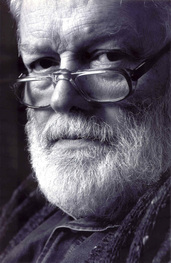 Michael Longley Michael LongleyPhoto credit: Kelvin Boyes Michael Longley was born in Belfast in 1939. He has published nine collections of poetry including Gorse Fires (1991) which won the Whitbread Poetry Award, and The Weather in Japan (2000) which won the Hawthornden Prize, the T.S. Eliot Prize and the Irish Times Poetry Prize. In 2001 he received the Queen’s Gold Medal for Poetry and in 2003 the Wilfred Owen Award. He was awarded a CBE in 2010 and was Ireland Professor of Poetry, 2007-2010. Catherine Graham: Congratulations on winning the Griffin International Poetry Prize for your tenth collection, The Stairwell (Cape Poetry). Like a stairwell, this book contains poems of passages—birth and death, childhood and old age, conflict and peace. During your acceptance speech you mentioned that you’ve been writing since you were 15. Was there a moment when you realized you were a poet or was it something that just built up over time? Michael Longley: It built up over time. I feel very superstitious about calling myself a poet. It’s what I most want to be. CG: The Stairwell consists of twenty-three elegies for your twin brother, Peter. Homer’s Iliad also permeates the collection. I wondered if you could talk more about how this book came into being. ML: I was with Peter when he died. At the time I wondered if I would ever be able to write an elegy for him. I ended up writing twenty-three. I gathered them into the second half of the book as a sustained lamentation. As so often in the past Homer came to my rescue and helped me to find the words. In some of the poems in the first section I celebrate grandchildren, and that lightens the elegiac tone a bit. Arrivals and departures. CG: When you were a student at Trinity your first poem “Marsh Marigolds” was published in a literary magazine called Icarus: She gave him marigolds The first three lines are weaved into “Marigolds, 1960” uniting the young poet you were with the experienced poet you became. It’s one of my favourites in The Stairwell. Can you tell us more about this poem and/or the process behind it? ML: The poem was published in the Trinity College literary magazine Icarus at Easter 1960. Although I didn’t realise it at the time, my father was dying. He discovered the poem and told me it wasn’t worth the paper it was printed on. He was right of course, but he shouldn’t have said that. In ‘Marigolds 1960’ I forgive him his frankness, but much more importantly I grieve for him and suggest that at the end we were drawing closer together. It pleases me that my juvenile verse helped me in my seventies to frame an elegy for my father. CG: You have said at this point in your writing life you have “all the tools for producing forgery and it’s important not to.” What constitutes forgery for you? ML: Faking emotions. Imitating yourself. Pretending you have something to say when you haven’t. Passing off five-finger exercises as true art. Silence is infinitely preferable to such shams. Indeed, silence is part of the enterprise. CG: Who were some of your early influences? ML: Walter de la Mare, Keats, e.e. cummings, Louis MacNeice, Auden, Yeats, Wilfred Owen, Edward Thomas, Hart Crane, Dylan Thomas, Richard Wilbur, D.H. Lawrence, Theodore Roethke. I was quite promiscuous. CG: What are some of the biggest changes you’ve seen in the world of poetry since you started? ML: The word processor and the way it encourages you to mistake garbage for the real thing. The Creative Writing industry and the retreat of poetry into academe. A good poem is just as rare an event as it always has been. CG: Can you share some of the highlights of your Griffin experience? ML: Meeting my fellow poets and sharing with them the nervy excitement of it all. Being charmed and impressed by Scott Griffin and reassured by his marvellous staff. Not expecting to win and then winning. Phoning my wife in Belfast to give her the good news. The bigheartedness of the whole enterprise. The vision and the details. CG: What’s next for Michael Longley? ML: I have written about half a new collection of poems. I am also putting together a selection of my prose – essays, lectures, introductions, articles, reviews. And I am working on a memoir – before I forget everything . . . MICHAEL LONGLEY'S MOST RECENT BOOK |
"Dementia became a metaphor; I began to see the time we’re living in through a lens of dementia." |
Jane Munro: That’s a good question. I remember feeling it was hard to justify spending time on poetry—instead of doing something obviously useful—when there was no external evidence that I was a poet.
As a young mother with three children, I'd go so far as to ask myself, if I weren't me but a young male poet deciding whether to hire a babysitter so he could work on poetry or save his money and spend time with his kids, or some other such choice I found difficult, would I know what to do?
I’d know. It wasn’t always the same answer, but when I called myself a poet and took being a woman out of the equation, I’d know what it was best to do.
Even after I’d published books, being a poet felt different from being someone who composed poetry. I juggled writing time with time for family, earning a living, studying. Did real poets live the kind of life I was living?
At some point, I stopped worrying about whether or not I was a poet.
Perhaps the turning point came when I figured out that my best contribution to the welfare of the whole was to be myself – liver cells didn’t help the body by trying to be bone cells (not that they had such a choice) – and that being oneself wasn’t “selfish” (my mother’s accusation about artists). It also helped to grasp that even DNA is flaky: mathematicians could devise a stronger code.
CG: The first of four sections, “Darkling,” is a sequence of poems numbered one to twelve that seems to counteract a husband’s descent into Alzheimer’s by celebrating the physicality of life with its vivid, precise and sensual imagery: “the glans of a penis, smooth as an acorn,” “The stone that made me think of a full soul / smooth and heavy in my hand,” “A candle guttering.” In the second Darkling, the defiant line “Peeling the grape of death” appears. Your poems are like peeled grapes, more flesh is revealed as one reads them through. Can you tell us about the origin and development of this book?
JM: In a crisis, sealing off vulnerable parts may allow you to do what’s essential. But when it’s not exactly a crisis, even though your reality is a slowly aggregating disaster (such as dementia or what’s happening with climate change), locking yourself into coping mode (being hide-bound) isn’t synonymous with self-protection. But it’s easy to get trapped in the pain of grief.
When I started writing the poems in Blue Sonoma, I had classic responses to pain: anger, self-pity, helplessness, hopelessness. I was even afraid my own life was over.
Making art took heart, mind, body and spirit. Working on the poems made me feel whole. There wasn’t any choice about vulnerability. Peeling the grape of death meant more flesh was revealed.
Dementia became a metaphor; I began to see the time we’re living in through a lens of dementia. If the poems were to provide architecture for the imagination of others, they had to be inhabitable. I didn’t think of them as mine though they came through me and drew on my resources. That’s why I like doing readings: it’s my chance to sense the poem complete its transitive arc; feel others move into it, furnish it with personal stuff.
I don’t know if this answers your question. I wasn’t in any rush to finish the book.
CG: It does answer my question, thanks. In the section “Dream Poems,” dream-reality is reproduced through stark and stirring imagery. These poems are often laced with a post-dream realization such as the last line from “The net of heaven is cast wide”: “He is not a person I knew in life.” Could you tell us more about your relationship with poetry and dreams?
JM: In the iceberg of consciousness, the vaster realm floats beneath the surface of day-to-day thought. Sometimes, I feel that we all share an unconscious reservoir of imagery and story.
While I was writing Blue Sonoma, I was recording dreams. This kept me in a conversation with images from the less-conscious parts of my mind. If I’m right that we share some of this material, then dream imagery might also connect with deeper layers of the reader’s consciousness.
Not every dream comes from that level; some appear to simply recycle a day’s debris. The poems in the second section of the book are records—translations—of specific dreams. Many of the other poems in Blue Sonoma draw on dream imagery, or move as dreams move. Each of them was a mystery. During its gestation, I’d be curious to meet it. For some, that took a long time.
CG: The spare and moving 11-part sequence “Old Man Vacanas” is cutting in its frankness and dark with black humour. The consistency of the voice addressing or observing “the old man’s” struggle with dementia links the poems into a cohesive monologue. How did this section come together for you?
JM: The “Old Man Vacanas” are contemporary approximations of an ancient poetic tradition. In Kannada, a South Indian language, vacana means “saying; thing said.” Vacanas are colloquial prayer poems using natural and domestic imagery to voice—often, complain about—family, village, spiritual, and philosophical issues. Unlike poetry in Sanskrit, they aren’t aureate.
The 12th Century vacanas were prayers addressed to Shiva—or, more precisely, to the poet’s personal deity (Mahadeviyakka calls on “my lord white as jasmine”). In “Old Man Vacanas” the “you” is not identified. I thought of the “you” as the listener.
The poems in this sequence started coming during a snowstorm when we were cut off—the roads impassable. I wrote one after another. This doesn’t happen for me very often, not with that intensity: every time I sat down, another came. I liked them and kept them. Later, others came. I couldn’t tell how long the run would be so played around with it over the next five or six years. Eventually, “Old Man Vacanas” came down to the set of eleven in Blue Sonoma. It was an odd number.
CG: What is the best piece of writing advice you’ve been given that you use?
JM: Write as if you’re already dead. This advice is attributed to Nadine Gordimer, but it reminds me of Krishna’s injunction to Arjuna in the Bhagavad Gita: surrender the fruits of your actions.
Yogis say we have the pleasure of doing our work but no control over its outcomes. That’s the thinking behind Karma Yoga (karma means action).
Yoga practices end with Savasana—corpse pose—during which you let go everywhere, release what you did or didn’t do, drop body and mind into stillness and silence. It’s refreshing and energizing.
CG: What were some of the highlights from your Griffin experience?
JM: Oh, my! It was all extraordinary: reading to over 1000 people—Koerner Hall filled with poetry and their attention; meeting and listening to the other shortlisted poets; the generosity and sincerity of the Griffins: their love for poetry, their vision, their attention to every detail; meeting the illustrious Griffin Trustees and jurors, many of whom I hadn't met before; the recitation by Ayo Akinfenwa (finalist in Poetry in Voice) at the gala; the way everything left me feeling hope for poetry. And, of course, winning: my daughters and friends with me—even distant friends and family watching. A Griffin has wings. I was transported.
CG: What advice would you give to an aspiring poet?
JM: Read and write, read and write, then read some more. Relax; be present; be curious; pay close attention; be patient.
CG: What’s next for Jane Munro?
JM: Writing: settling into my own rhythms and practices and work. That’s the main thing. This fall, thanks to an apartment exchange, I’ll spend a month in Germany. I was in India for two months last fall studying yoga. It’s ages since I had much time in Europe.
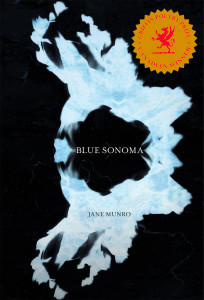 =
= Jane Munro
Brick Books, 2014
Winner of the 2015 Griffin Poetry Prize
A wise and embodied collection of dreamscapes,
sutras and prayer poems from a writer at her peak
In Blue Sonoma, award-winning poet Jane Munro draws on her well-honed talents to address what Eliot called “the gifts reserved for age.” A beloved partner’s crossing into Alzheimer’s is at the heart of this book, and his “battered blue Sonoma” is an evocation of numerous other crossings: between empirical reportage and meditative apprehension, dreaming and wakefulness, Eastern and Western poetic traditions. Rich in both pathos and sharp shards of insight, Munro’s wisdom here is deeply embedded, shot through with moments of wit and candour. In the tradition of Taoist poets like Wang Wei and Po-Chu-i, her sixth and best book opens a wide poetic space, and renders difficult conditions with the lightest of touches.
Grey wood twisted tight
within the framework of the tree –
impossible to snap off,
forged as it dries.
And in me, parts I can’t imagine
myself without – silvering.
~from “The live arbutus carries dead branches…”
Praise for Jane Munro:
“spellbinding … haunting … thoughtful, evocative … arresting images … Zen-like spirituality… ” ~The Toronto Star
Excerpt from Blue Sonoma, Brick Books 2014
In a small boat off Port Renfrew
caught the moon.
It was pale and pocked.
It lengthened from disc to oval to flat fish
as she lifted it. The rod bowed.
When the rod’s tip touched the water’s surface
the moon sprang from the wavesstreaming foam, and soared overhead.
The woman fell on her back –
winded, wordless – rocking as the boat rocked.
The moon hung above her
huge and closer than a star.
It had grown on a tongue of silt
at the river’s mouth, dark-side-down
resting on its mind-reading side,
then slid to deep waters.
Staring up at it, the woman knew it knew.
RUSTY TALK WITH RUSSELL THORNTON
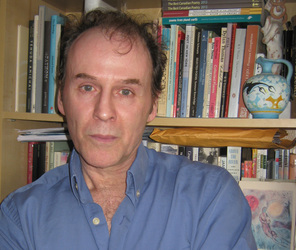 Russell Thornton
Russell ThorntonCatherine Graham: Congratulations on your Griffin Canadian Poetry nomination for your collection, The Hundred Lives (Quattro Books). Was there a moment when you realized you were a poet or was it something that just built up over time?
Russell Thornton: I don’t think much about being a poet, to be honest. I do think a fair bit about writing poems. I’ve always scribbled poems—since I was around 9 or 10 anyway. Before that I often made up rhymes and poems and kept them in my head. I started saving poems I’d written when I was 19-20. I guess that very late teenaged period was a threshold in a long build-up. From my early twenties on, I knew that I wanted to try to write a decent poem. In fits and starts and with many detours, producing poems has been important to me since that time.
CG: The first section of The Hundred Lives, "With a Greek Pen," takes us to Greece. Did you go there specifically to write? Tell us about your relationship with place.
RT: I went to Greece because I interviewed in Vancouver for a job in Greece and got the job. I’ve never gone anywhere other than a kitchen table or a corner of an apartment to write—except for the last few years when I’ve sat in the local public library for an hour or so a day five days a week (if I’m lucky). Banff, Sage Hill, Spain, Scotland, Iceland, Vermont—I wish! Who knows? Maybe one day.
I’m aware that to say that place in the traditional sense is important in poetry is more than a little out of literary fashion at the moment. Our “place” is social media, electronic culture, and the global urban reality. I’m not averse to what the new “place” might help produce in poetry—but place in an older sense is more significant to me. Do you know that wonderful poem by Wallace Stevens, "Anecdote of Men by the Thousand"? A couple of the stanzas have always hit me as being very true:
There are men of a province
Who are that province.
There are men of a valley
Who are that valley.
There are men whose words
Are as natural sounds
Of their places
As the cackle of toucans
In the place of toucans.
The dress of a woman of Lhassa,
In its place,
Is an invisible element of that place
Made visible.
But of course Greece affected and continues to affect me. I lived in Larissa and Thessaloniki for a few years—coming back to Vancouver a couple of times to drive taxi for a while. I’ve returned to Greece several times over the past decade. I’m struck again and again by the power of the place—that hypnotic white light, that eerie ubiquitous rock, that sea. In terms of the people and culture of the place, there is that deeply wild music, and there is that set of gestures; that excitation and sense of vastness coming always into strict specificity and form. I might have based myself permanently in Thessaloniki or Athens if the person I met in Larissa and became engaged to hadn’t died a very early death from cancer. In the section of poems in this book of mine that you mention, “With a Greek Pen”, she is the person other than me in many of the poems.
CG: The poems in the second section, "Lazarus’ Songs to Mary Magdalene,” are responses to the Gospel story of Lazarus and are sonnet-like in shape. Is there more to tell us about your use of the sonnet or form in general?
RT: I’ve always loved form in poems. After all, most of the great poems of the English language employ significant aspects of form! Shakespeare’s sonnets are the obvious example. When I first began getting poems in magazines, I knew my poems looked a little more formal than most of the things I saw around, especially in west coast publications. I was using quatrains, counting syllables, and so on. Around the same time, of course, “formalism” was beginning to display force in Canada. But I’ve never been interested in form for form’s sake, or for trying to show off, or for trying to gain false authority. A lot of contemporary formal poetry reminds me of paint-by-number artwork. It’s unnatural, laboured, and empty. I’ve always been attracted to authentic heightened natural speech. I think adept use of form can help with that—but certainly not always. At the very least, poetic form can serve as somewhere to hang one’s hat, so to speak. It can aid in the control that is a basic principle in poetry. In my own case, I’ve been profoundly affected by my discovering that emotion can usher me into form without my initially dictating that form. It’s a humbling experience. Do you know that incredible poem by Emily Dickinson? The first line is “After great pain, a formal feeling comes—”. The emotion is foremost. There’s that Ezra Pound pronouncement: “Only emotion endures.” If you happen to start with form, and emotion, thought, and imaginative energy don’t take over pretty quickly, form is nothing.
As for these particular sonnets of mine, my hope is that the sonnet form helped me with the control of emotion and the dramatic organization. These pieces are meant to be “little love songs” in the traditional sense of the sonnet. But they’re only very loose or rough sonnets. They’re fourteen lines long, the lines are usually ten syllables long, and they have “turns”—but that’s it. No rhyme scheme. No formula for stresses within the lines. And so on. The loose form flowed naturally out of the material of the poems.
CG: What was it like for you reading at Koerner Hall the night of the Griffin shortlist readings?
RT: Well, I didn’t piss my pants. And I didn’t forget my name or how to speak English. It was an exciting literary ride, let me tell you. Do you know of a talk that Sharon Olds gave once about a big award experience? It’s on some video that I once took out of the Vancouver Public Library. She says that she felt as if she was standing at a stage on the audience side, on tiptoe, holding herself at the edge of the stage with her fingers and looking across the stage, her eyes just high enough to see the shoes of the poets who were about to read their poems.
That’s how I felt reading at Koerner Hall. I had to keep reminding myself that I was actually one of the readers.
My best little memory is this, in two parts: Michael Longley and I sat together for a few moments in the Koerner Hall “green room”. He saw me gobbling my Halls. “Are those sweets?” he asked me. “Could I have one?” He mumbled something about “sugar level”. I gave him a couple of Halls. Later, at the after-reading gathering, I found him in a lull. I told him that I carried several of his poems permanently in my head, just wanted to tell him, and how nice it was to meet him. I said the first line of his poem “Swans Mating”. I think maybe I was going to say the whole poem. Anyhow, he took it from there and quietly and lyrically recited the whole poem by heart to me. On the spot, in a little humble, holy space in the midst of the noise.
CG: Who were some of your early influences?
RT: My very earliest influence was my maternal grandmother—who published hundreds of stories under various pseudonyms in what were once called “women’s magazines”; she was a talented storyteller. She was actually more truly a writer of poems, though little published except in newspapers when she was a teenager (there were few opportunities for magazine or book publication in her day; she wouldn’t have known about them anyway). She had a gift for metaphor and a wonderful ear. My other early influence was Irving Layton. I met him in Montreal when I was 19, took a course with him, and in the years after that we became friends. Like a lot of people, I came under his spell. His personality and the power of his poetry held me. I continue to be swayed by his several masterpieces—the rhythms, the verbal texture and colour, the full, radiant passion in the utterance.
CG: What is the best piece of writing advice you’ve been given that you use?
RT: "A great poem is a noble work, and no one ever wrote one who didn't want to get out of hell."—Irving Layton
CG: What advice would you give to an aspiring poet?
RT: Read, read, read. Write, write, write. It’s the advice I give to myself.
CG: What’s next for Russell Thornton?
RT: For the past year or two I’ve been working on a manuscript that I’m tentatively calling The Terrible Appearances. What’s next is stealing daily time to try to transform my scribblings into finished pieces.
RUSSELL THORNTON'S MOST RECENT BOOK
THE HUNDRED LIVES
QUATTRO BOOKS, 2014
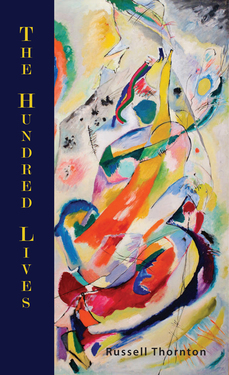
In The Hundred Lives Russell Thornton illuminates the intricate imaginative orders of love at work within an individual life.
From poems set in the eastern Mediterranean, with its abiding reverberations of the ancient Greek world, and informed by sacred sites and classical stories, to a series of sonnet responses to the Gospel story of Lazarus, to a lyric-narrative engagement with the mythic-erotic drama of the Biblical Song of Songs, to intensely personal poems that explore love and loss, this collection highlights the mystery of the interplay between inner and outer energies at the core of human experience.
THE CHERRY LAUREL
chewed cherry laurel leaves. When the poison
took hold and ushered them into frenzy,
they would see the vale was a hovering
of matter, a glittering haze. The earth
their bare feet danced on, and that had brought forth
everything around them, would, if they
threw off the names they had used for themselves,
begin to reveal to them what there was
of eternity in the world.
The vale
could open into a being, human,
yet other, whose name was a limitless,
pure embrace in an instant with no end;
then could close again and be a chaos
of innumerable identities
interspersed with abyss upon abyss.
It could pour blind currents of life, of death,
through the women’s living skulls, and plunge them
into metamorphoses—so they might
suddenly know more than any mortal,
having become the vale itself, knowing.
Some would never return from such knowing,
and collapse and die. But others would now
be called Daphne, the name for the laurel,
and be priestesses.
The light of the vale
is in love with those frenzied ones—the rays
sent as from Apollo still following
the woman who ran from him and escaped
when she was changed into a tree. The fate
of even Apollo’s love is held here
in the laurel branches. Here, your own fate,
though you do not know that fate, pours through you,
while the light, the vegetation, and rock,
so bright, so mysteriously exact,
are a moving stillness about to speak.
Vale of Tempe
RUSTY TALK WITH MIKE WATT
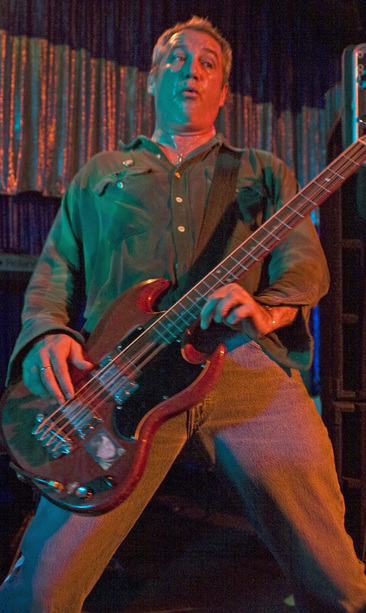 Mike Watt
Mike WattPhoto Credit: Carl Johnson
Mike Watt played bass in Minutemen, and for that his place in musical history is assured. However, Watt is not a man to rest on his laurels. When he turned 57 in December of last year, he'd recently completed a 51-shows-in-51-days US tour with his band Il Sogno Del Marinaio (his two Italian bandmates are in their 30s). Earlier in 2014, he toured Europe with one of his other bands, Mike Watt + The Missingmen, and after a flurry of US shows at the beginning of this year he is now back in Europe with the Missingmen, this time touring his third “punk opera”, Hyphenated-Man. He’s released 5 albums in the last 4 years on his own clenchedwrench label. He hosts a radio show and podcast called “The Watt from Pedro Show”. He publishes extensive tour diaries on his website, a rich self-archive he calls hootpage. He also makes albums and tours the world with the Stooges, for whom he has played bass since Iggy Pop reformed the group in 2003. So if you wanted to call Mike Watt the hardest-working man in punk rock, there would much to back that up. It’s a title Watt himself, with his stubborn prole modesty, would probably take some pride in. However, to do the man justice you’d have to expand on the terms employed.
Watt doesn’t just work the bass back and forth from stage to studio, he also works up and down, plumbing depths and scaling heights. While musicians reared on Minutemen are already embarking on reunion tours, Watt remains restless and forward-looking, constantly challenging himself with a range of new projects. All this to say that hard work, for Watt, doesn’t simply mean pounding the pavement and honing his craft—it also has something to do with artistic renewal and growth.
Then there’s the question of what is meant by punk rock. Minutemen were founded in 1980 by Watt and his childhood friend, guitarist D. Boon, in their hometown of San Pedro, California (drummer George Hurley completed the trio). While the band was among the pioneers of the West Coast punk scene, their distortion-free sound was never exactly what most people thought of as punk music. Minutemen’s brilliant run came to a sudden, tragic end in 1985 with D. Boon’s death in a car accident. Watt’s subsequent output in bands like fIREHOSE, Dos, and others has veered even farther from the strict genre of punk, but as Watt points out, for him and D. Boon punk was an idea more than a musical style; it was an ethos, a politic, a practical philosophy, a movement. Few bands put this idea to such inspired use as Minutemen, and fewer people have remained as fiercely, and productively, committed to it as Watt.
My excuse for proposing an interview was that I had recently read and admired Watt’s 2012 book Mike Watt: On and Off Bass. It pairs his handsome digital photographs of San Pedro with excerpts taken from his tour diaries, which are written in searching chunks of rhythmic, Beat-like poetry-prose.
the band’s making quite a sound but there’s another aspect that’s much impressed upon me also – this energy electricity-sounding-like-fabric-ripping thing that’s put a big awareness on me … prying my pie-eyed eyeholes even wider to push this scene inward to pull my mind more outward. (july 23, 2005 – carhaix, france) |
As we were wrapping up, I asked him what he’d been reading lately and he proceeded to rattle off a diverse list followed by characteristically to-the-point capsule reviews. Some of the books included a collection of interviews with Ivan Illich (“Interesting cat”); 1776 by David McCullough ("I was thinking this is a book that somebody would give D Boon. That’s why I read it … but it was kind of lame.”); Beatrice & Virgil by Yann Martel (“It ain’t about fucking Dante I’ll tell you that.”); The Master and Marguerita by Mikhail Bukakov (“That is a very good book. I really liked it.”); The Pillowbook by Makura no Sōshi (“Yeah, it’s basically something like aesthetics – here’s what I like, here’s what I don’t like. Really trippy.”); and books about Stalin and Mao ("Fuck, talk about trudges … 800 pages each.")
A conversation with Mike Watt is a history lesson in the best sense. He is aware of how rich his past is, and he’s given it much thought so he is happy to talk about it – sometimes fondly, sometimes not, though he never sounds nostalgic or bitter. Speaking in the same singular vernacular that features in his writing, he is blunt and self-deprecating and enthuses easily. His energetic mind roves happily and rapidly, embarking on top-of-the-head riffs that can initially seem like unrelated tangents but eventually reveal themselves to be variations on the themes he is always circling: writers and artists; punk rock and D. Boon; peddling, paddling, and Pedro.
Our conversation took place via Skype last in December and has been edited and condensed.
MICHAEL VASS: How did your book On and Off Bass come about?
MIKE WATT: It comes from an art show I had in Santa Monica a couple years ago at Track 16 Gallery … Well, let me start at the beginning. In the ‘90s, Columbia, the label, gave me a [digital] camera to bring on tour. Using one of these cameras, you don’t have to buy film. You can take chances and if the shot is lame you just delete it. This was just a whole other sensibility. I’d had a photography class in, I think, the 10th grade, that’s the only kind of picture-taking experience I had. So I came back from tour with this camera, and around the same time I started riding a bicycle again after 22 years. I don’t know if you know where San Pedro is, but it’s a harbour of Los Angeles, so we’re trippy for So Cal. We’re very much a working harbour.
MV: Not a beach town.
MW: No, not really. But it does have nature. It has these cliffs, the end of the land is here, mixed in with these docks and hammerheads and cans and big boats. So I started taking pictures with this camera. And then, about four or five years of that and my knees were killing me, so I started doing kayak. Point is, when I’m not on tour and I’m in my Pedro-Town, I’m up at the crack of dawn, in a sound kind of mind. I’m trying to capture it with pictures. I’d float these [pictures] around to my buddies on my email list. Laurie Steelink said, "Oh, we should print some of these.” I said, "Like which ones? Here I’ll give you a bunch and you just pick." So she picked these out and put them on the wall of this gallery, Track 16, and people came … It was a trip, I’d never done anything like that. A couple people at the show were Kat and Peter from Three Room Press in New York City. They were thinking, "Hey Watt why don’t you put this in a book? You do this diary when you’re on tour. So we’ll juxtapose diary entries when you’re out of Pedro against pictures with you in Pedro." I said, "OK, you go up on hootpage, you see all my diaries, you take the excerpts you want." So both situations, pictures and the spiels … I mean I did ‘em all, but I didn’t really pick them. So in a way, it’s kind of curated, or edited.
MV: So you put all your tour diaries online?
MW: Yeah. To me in this day and age, I don’t know what you guys think, because there is something about a book … But you put it on the internet and in a way you’re publishing it too.
MV: Yeah, of course.
MW: OK, you agree then?
MV: Well, The Rusty Toque is an online journal.
MW: Ah OK, so none of it’s hard copy? See that’s the way … People were telling me, "Man, you should print up these diaries!" I said, "They’re already published when you put them up on the fucking internet, people!"
MV: Did they run their decisions by you, about which photos and diary entries they chose?
MW: Maybe I had some little opinions about things. But I wanted some kind of objectivity, because I’m too close to this shit. I didn’t take those pictures or write those diaries to become a book or an art show. So I felt I didn’t have enough perspective. You know, I was new to this kind of field, so I didn’t have the confidence. I didn’t want to come off as so self-important, like I knew exactly what people wanted to know about me. Actually, you know, it’s my second book.
MV: There was a book printed of your Minutemen lyrics, right? [Spiels of a/ d’un Minuteman, published by L'Oie de Cravan]
MW: Yeah, the words I wrote for the Minutemen. In fact, that’s from your parts, Canada.
MV: From Montreal …
MW: That’s right. A little publishing company that puts out poetry. They did a translation, every other page is the Quebecois. The Minutemen were using a lot of slang ourselves, so I thought that was neat. We all get kind of provincial in our talking, our slang. At the same time language is for communicating, you know? By reading those words you might get a sense of what it was like to be in a band with D. Boon and George Hurley. That was my idea with that. I even put my first tour diary in there. I wrote one because it was the first time the Minutemen went to Europe with Black Flag. Man, I was really bad at it. Actually, diary writing – there’s kind of a technique to it.
MV: How did the diaries start for you?
MW: I do it on tours for a couple of reasons. One is just to keep it together, keep focus. Another one, I am writing for younger people—not to be their eyeballs, but to inspire them to get first hand experience. This idiot old guy in Pedro, driving around and working bass—if he can do it, you can do it too. The reason that I’m into that is I still consider myself part of the movement. And I owe the movement. The movement was so loose and autonomous, they let people like me and D. Boon living here in Pedro put on a gig. And Greg Ginn at SST – we were SST 002, the second SST record. That was an incredible opportunity that the movement gave us. I feel a debt. Since I was allowed to let my freak flag fly, I wanna turn people on to the same kind of trip.
MV: So going back to the diary writing – how has it changed for you? What are the techniques you learned?
MW: Well, the biggest enemy of diary writing is memory loss. Especially when you tour the way I tour, because I play every day. So you’ve gotta do it the next day. If you get behind, everything blends into the same fucking thing. Each day is unique. I mean, you can get all reductionist, you know: woke up, took shit, took piss, ate chow, drove to gig, did gig, conked … repeat. You don’t wanna do that. You wanna build in the nuances of the minutia, and still fucking live your life. You gotta do it kinda recent to the event so things are fresh. You gotta try to not write the same fucking thing every day.
MV: So you’re pretty disciplined about it when you’re on tour?
MW: Yeah, try to do it every day on tour. It really helps me focus and play better. Diary worked out for me like that big time. Especially when I’m thinking, where did I blow clams? Can it go better? What stupid fucking things did I say? It’s kind of a self-critique thing too. You use your own self as a sounding board. I’ve heard of these kinds of techniques people do in therapy, they’re asked to do diaries.
MV: Right, I’ve heard of that too.
MW: So who knows … Even when Mr. Poe or Mr. Twain or Mr. Whitman, even when they were doing their trips, who knows. That’s what’s trippy – about the work, the person, the reason for the reason, the technique … That’s why human expression is interesting to me. Besides being fabric that kind of connects us, it’s also a way for us to express ourselves, like our fingerprints already do, but at the same time, kinda resonating on the common ground we all share. So what’s important at the end of the day with the diary shit is doing it. What is it D. Boon would say-- “The knowin’ is in the doin’.” That’s the diary idea.
Now the other way I write words is for tunes. And that’s a different trip, because you’re trying to serve the tune. I usually always start with the title. Just like with the diary you always start with the date. I need some kind of form.
MV: You start a song with the title?
MW: Always. Because it gives me some kind of focus. I’m not saying everybody’s gotta do it that way, I’m just telling you … Shit, I never thought I was ever going to be doing this. I got into music to be with D. Boon, I wasn’t really a musician. And uh, yeah … he got killed, and I kept going. I’m still a student.
MV: Had you written anything before the Minutemen?
MW: When I was a teenager I wrote one thing. It was called “Mr. Bass, King of Outer Space”. [Laughs] I can’t remember the music or even the words. But I do remember the plot, or whatever you want to call it, of the tune was I do a big bass solo and blow everybody off the stage. [I was] socially kind of insecure. I’d learned about bass hierarchy, that it’s where you put the retarded friend. It was like right field in little league.
Nobody D. Boon or I knew wrote songs. I’m 13 in 1970, so we’re ‘70s guys right? In the ’70’s culture there’s no clubs anymore, that ended with the ‘60s. Now it’s arena rock. So the performances are like Nuremberg rallies, there’s no empowerment. You’re sitting so far away, the band is tiny, all the lights … That’s not empowering. That’s like you’re at the fucking circus.
It was much different when punk, when the movement, came. It made everybody in the band way more equal. And especially with a guy like D. Boon. He wanted to put the politics … They weren’t just in the lyrics, they were in the way we made the music in the band. D. Boon was really heavy about that, which I’m glad for. Like he learned from R&B that the soul music guys would play really trebly guitar, really clipped, no power chords. So [by making his own guitar really trebly], he was making room for the bass, making room for the drums. He said it was like an economy, he wanted a more egalitarian economy.
MV: What did you think of that?
MW: It was trippy at first, we’re young men, you know. But punk was so fucking profound on us, it just made us rethink everything. Nothing from the arena rock experience. I think this is one of the things that made us embrace the movement even more. When the hardcore kids came out a few years later in the early ‘80s, they weren’t really rebelling against the old rock because they never knew it. In a way, we were much more reactionary than those guys.
MV: So when you started writing, you’d think of a title and go from there.
MW: If I got the title it would give me enough fucking focus that I could either bring the words in, or bring the music in, or bring them both in, so that—at least in my idiot mind—they would make some coherent sense. I say that because D. Boon would say that my lyrics were too spacey. [Laughs] You know that’s why on Double Nickels on the Dime I’m reading that landlady’s note (on “Take 5, D”). That was kind of—not a rebuttal, but me just having some fun with him. “OK I’ll try to be more clear here, more real, more real.”
At first we thought words were kind of like lead guitar or something in songs. It was mysterious what words were about. But when we saw the punk gigs … I remember D. Boon coining this phrase “Thinking out loud.” Ah – that’s what they’re for! You can actually use the music to express thoughts, feelings—that was totally new to us. Before that it was all about trying to copy some licks or something. The idea of using art—and I’m talking about poems, painting, all this stuff—to express stuff … It sounds naïve, but man that was a huge mind-blow for us in the ‘70s.
MV: You guys were also teenagers, that stuff blows a lot of teenaged minds.
MW: I also think that the stuff from the ‘60s had gotten forgotten already. Everything goes through these cycles it seems. I think we were in this time that was very much: “Well, we’ll take a couple people, they can be the elites and speak for us all.” And I think when the movement came, just like the Beat thing, and before that people like Woody Guthrie, before that people like the Dada people … It’s sort of like farmers and fertilizer—if you want a good crop, use a lot of shit. It seems like you need these things to inspire other kinds of reactions.
Even though it was a really fucking lame and stupid time, we were also very lucky. The Minutemen was in a very lucky place because no one knew exactly what to do with the movement, so you could help be part of that invention. Every time is a good time to be born, but for the Minutemen graduating high school in 1976 was just so lucky.
MV: Back then, how did you guys approach the musical side of things?
MW: Maybe us learning the Blue Oyster Cult and the Creedence helped us a little as far as getting licks together. But we thought that was really secondary. That’s what punk rockers taught us. Bands like the Urinals—the song’s all one chord! We thought that was so fucking econo … What’s the other word for it? Elegant, elegant. You just need enough. Like when you see a Vincent van Gogh painting there’s not too many strokes, there’s just enough.
Socially that opened us up to a whole bunch of wild people too. Those people in the early punk scene, they all were very deep. They were strange and weirdos, and that’s why they invented this parallel universe. But they were very interesting and inspiring. Now, down the road 35 years I’m talking to you. And it’s all because I was in a band with my buddy, and I was part of this movement. Actually, me and you probably have more common ground than a lot of my peers did in those days.
MV: Were you guys reading a lot back then? You mentioned poetry was inspiring.
MW: Yeah, yeah. As a teenager I was huge into the Divine Comedy.
MV: Already as a teenager?
MW: Yeah, I don’t know why. It was like some kind of puzzle to figure out. All the names, all the people, all the fucking weird-ass stuff, you know? Punishment, atonement, reward or whatever the fuck—trying to make sense of this shit. I don’t know how I stumbled onto it. It was in the 10th grade, so maybe 16, 17? So that was the first big poem I got into. Around the same time I got into Huck Finn. Before that I was reading a lot of science fiction. You know I’m born in ’57, so when I’m a boy it’s all about the space race, the Soviets and US. So I was reading a lot of this stuff, Ray Bradbury, Mr. Dick, even some [Robert] Heinlein, Frederik Pohl, and Roger Zelazny … these science fiction things.
The other thing was dinosaurs, I was into dinosaurs. So I think this was one reason … Well, what happened was my mom got me this World Book encyclopedia, the door-to-door guy sold us these encyclopedias. They start from A and go to Z. So when I got to the Bs I found this guy Hieronymus Bosch, I think that might have steered me toward Dante too. It was so bizarre, all these little creatures – which kinda reminded me of the dinosaur stuff.
And D. Boon got me into history, that’s what he read. I wasn’t that much into non-fiction, I liked fiction.
MV: He read more non-fiction?
MW: D. Boon read almost totally non-fiction. I can’t remember any fiction he read. So that influenced me. I got into that stuff because I wanted to talk about what he was talking about. He liked history a lot. As far as fiction, well because of the punk rockers teaching me, like Raymond Pettibon, I found out about Jim Joyce. So I got really big into Ulysses. In fact, almost all of my songs on Double Nickels on the Dime are inspired by Ulysses. Writers started to become a big source of inspiration for me. And the poet I was into at the beginning of punk was Rimbaud. “The Drunken Boat”, A Season in Hell, “Democracy”. I even put music to some of these things, even though he’s writing in fucking French and I’m reading translations. But this idea where he had colours for the vowels … I was just at a very impressionable time, that thing where anything goes. As I was saying the movement was profound. So I got into all this kind of literature, wild-ass stuff. A Bohemian kind of thing. The Beat people – Mr. Burroughs, Mr. Kerouac, Mr. Ginsberg’s Howl, Mr. Pynchon. I guess he’s more psychedelic, with Crying of Lot 49, and then Gravity’s Rainbow. The 60s thing …
See I’m a boy in the ‘60s. ‘69 I’m 12 years old. It was a strange place. I saw a lot of things. I saw Mr. Oswald shot to death on TV. I saw people on the streets for civil rights, taking things into their hands about wanting change with the war in Vietnam. I’m in Pedro because of Vietnam, ‘cause my pop’s a sailor. So I am kind of a product of those times. I’m not really a ’60’s person, but it did have a huge influence on me I think. Just as, in a weird way, I’m not a ’70’s person either, but the ‘60s and ‘70s really grounded me. Made all my sensibility. Made me really encouraged to go for something and refuse another thing. And wanting to get in on this, I don’t know … further, beyonder, you know, the Last Poets. [Laughs] I was really into Last Poets. It’s trippy how rap came out of that. It made total sense to me when that happened. Kinda like black punk.
One thing about being a ’70’s teenager, [it was a] pretty narcissistic generation. You didn’t want to know about stuff that was 5 years older. It was really weird. We were all about ourselves. When I look back on that now, it was ridiculous. Very self-satisfied. I think it was because some of the counter-culture of the ‘60s got co-opted by commercial things in the ‘70s. And I think some people thought this was some kind of victory. That all the work was done. So thank god there was this tiny little movement that me and D. Boon fell in with, and music was one of its components. A lot of the dudes you could tell were not musicians. A lot of them were artist people. They were provocateurs. They wanted to make points. They wanted to be a little adversarial, a little confrontational. And then you know, this was kind of pushing buttons from our earlier programming seeing this [civil rights] stuff in the streets on the TV. It’s very interesting. We couldn’t really articulate it, but I think it does come out in our work.
MV: Yeah, I can see that.
MW: You know, McCarthy--a band on a record in 1980 talking about McCarthyism … I mean, this is just bizarre. But that’s what we were feeling. The new boss was Mr. Reagan. I think you guys had Mr. Mulroney, and over there in England was Ms. Thatcher.
MV: That’s surprising to hear that your interest in both Bosch, who you used for your Hyphenated-Man album, and Dante, who you used for Secondman’s Middle Stand, stretches all the way back to when you were a kid.
MW: Yeah. Richard Meltzer says that I’m his favourite sentimentalist! [Laughs] Maybe it’s weird going back to little boy shit.
MV: Dante and Bosch isn’t really little boy shit.
MW: [Laughs] Well, I mean my boy experiences. I’m not saying the subject matter. In fact, I was told by a high school teacher that I shouldn’t be reading that shit. Some lady at San Pedro High. She wasn’t an old lady either. “This ain’t a story for a young man”. I said, I’m sorry, but I kept reading it, I wasn’t gonna stop. In fact, I read different people’s translations. The Ciardi was the first one, but then I found the Longfellow one. There’s different ways to try to do it – with blank verse, or to try to keep the little three-rhyme thing going. In a way, it was like playing with a fucking Rubik’s cube, you know? It’s very fascinating to me. I don’t know about the subject matter so much. But the work itself is really fascinating. Just looking at anything and taking it apart.
MV: With Hyphenated-Man, for example--I know that was also partly inspired by when you participated in We Jam Econo [a 2005 documentary about the Minutemen] and started listening to Minutemen songs again for the first time in many years.
MW: You’re right.
MV: Did the Bosch connection just kind of pop up again then?
MW: No … I was on tour with the Stooges in Madrid at the same time that I’m listening to the Minutemen, in 2004—actually it was the 400th Anniversary of Miguel Cervantes’ Don Quixote, another great book, they had a big festival. Anyway, the hotel we’re at is right next to the fucking Prado. Prado’s got 8 Bosches. I couldn’t find them at first because they call him El Bosco. But I found El Bosco and saw them in real life for the first time. And it’s not like a picture in an encyclopedia, man. In fact, he painted on wood, they’ve got no glass so you can put your face right up there and see. And it blew me away. For some reason having this experience of re-listening to the Minutemen, I thought man this [Bosch’s work] is like a Minutemen album, or Minutemen gig, a bunch of little things to make one big thing.
MV: That makes sense.
MW: You know what happened? When I started hearing the Minutemen, I wanted to play music like that again. But then I owed it to D. Boon and Georgie not to rip them off. So I thought to myself, what if I made another opera, and I’ll write about something the Minutemen would’ve never wrote about—being a middle-aged punk rocker! [Laughs] So that became the libretto. I felt OK about that.
I wrote the whole thing on D. Boon’s Telecaster. I’m not that much of a guitar player, but I did it on purpose so the bass would come second. I was doing all these things so it wouldn’t be too much Minutemen, because I was feeling guilty about ripping my old band off, you know? There’s too much of that shit going on already. I don’t have to be another one doing that. So what I did is I tried to use that as like an appropriated thing, to make a new thing.
MV: You wrote all the guitar parts first?
MW: I wrote the whole thing, all 30 parts on D. Boon’s guitar, his Telecaster. You know, symbolically, it was very emotional. Talking about yourself is a fucking scary thing. You gotta lay it out there, but it’s still gotta be a fucking song. So I wanted to bring things out, be brave enough to say ‘em, but still be artistic with it. And D. Boon was a painter, you know, besides a guitarist and a singer and a songwriter. So I thought that he would just somehow help me, by using his machine. I even have the demos, all 30 of them. I recorded them all.
I’m glad you brought that record up, because that’s a real important one in my mid-life. It’s one I never would have thought of as a younger man. I thought it was all downhill after Double Nickels on the Dime. [Laughs] I wasn’t trying to do another Double Nickels on the Dime. I was visiting some earlier place in my earlier music, but I was trying to talk about something very contemporary, my life right at the moment. I even wrote it in order. Though at the end of the day I took the middle song and put it at the end, because the last song [“Man-Shitting-Man”] turned out to be a real downer. The way the mind works – just like looking at those Bosch paintings, they read from left to right – people might think that “Man-Shitting-Man” is my kind of, I don’t know, conclusion or summation of the whole trip. It’s not. Middle age is about reconciling a lot of things, but there are some things you can’t reconcile, and a lot of that is man’s inhumanity to each other, the way we treat each other. There’s no good reason for it, ever. And I had acknowledge that or else I wasn’t telling all the truth. That’s why I had to have “Man-Shitting-Man”. But I didn’t have to have it last.
MV: Have you ever had writer’s block?
MW: Oh yeah, it can come. It’s one reason why I used other people’s words. If you look on Double Nickels, they’re not all Boon/Watt/Hurley. If I used other people’s words, all of a sudden I’d get different licks coming out of my bass. Writers’ blocks, they come. There was a period in the early 2000s after that sickness. I had to tour a lot to pay off … You know about our incredible, wonderful medical system? $36,000. So I had to do a lot of tours. And I was happy to pay it off, because I was alive. [Laughs] But I had to play gigs where I was doing lots of cover songs … I was going through a little blockage period. Between the first and second opera.
MV: So the Secondman’s Middle Stand was hard to write?
MW: Well, it was easy to write because it was about that fucking sickness that almost killed me. I used the Divine Comedy as a parallel. The sickness was the Inferno, the healing was the Purgatory, and getting to ride my bike and kayak and play bass, that was Paradise. I wrote it pretty quick, but in the meantime I had to pay off these debts and do a lot of touring. Two tours a year. Bands like the Jom and Terry Show, The Pair of Pliers … I mean these bands didn’t even make albums. I put them together just to tour, just to get the money. So the one good thing was, even though I had some writer’s block, I was still performing. That’s kind of treading water a little bit, but it’s better than doing nothing, like putting the bass down.
MV: Finally, if there’s one word you’re associated with, it’s "spiel". Where did that come from for you?
MW: It’s Yiddish. A lot of show business talk is Yiddish because a lot of these cats—well fuck, they created the culture! There was a time with no TVs and theatres right, and so cats had to travel town to town ... Vaudeville. And in a lot of ways I feel very connected to this culture. The touring life, you know? I play rock and roll music, but the touring and that part, that’s way more into vaudeville culture. So I use a lot of these Yiddish words—I think it was a mix of Hebrew and German, with Polish and Russian. It comes from Jewish Europeans who immigrated over here and worked in theatre and then movies and in music too. Entertainment culture.
I got to play with the Stooges in Tel-Aviv and it was trippy, the young people there didn’t even know what Yiddish was. They speak Hebrew. So it was specific of a certain kind of people at a certain time. But this idea of workin’ the towns—you could say Shakespeare was [doing that], I mean all kinds of people were in this tradition. So spiel comes from this. And shtick, and kvetch and kevel and schlep. All these words come from this tradition I see myself as part of.
MV: But “spiel” was a Minutemen word too. You guys were using it already back then.
MW: Spiel was like your pitch, trying to sell somebody something, not an item so much but a point of view. And it doesn’t have to be jive. Of course some spiels are jive, but some spiels have a lot of integrity. I think the Minutemen used it for a self-humiliation thing. I told you, we were pretty insecure about lyrics—we didn’t even know what they were for. So if you were already making fun of them, maybe you’d be a little more brave to do it. So that’s why we called our lyrics spiels. Also, interviews we called spiels. Every time you opened your fucking mouth that was a spiel.
MV: Well, it kind of goes with D. Boon’s “thinking out loud” idea.
MW: Absolutely, absolutely. These things were empowering to us. It was a form of expression, a kind of power for little guys like us. Not power over people, but power to be creative.
| On and Off Bass by Mike Watt Three Rooms Press, 2015 Description from the publisher Three Rooms Press is thrilled to announce long-awaited European distribution for MIKE WATT: ON AND OFF BASS, a book of photos, poems and tour diary snippets from Mike Watt, the world’s foremost punk rock bass player (Iggy & The Stooges, Dos, Il Sogno del Marinaio, missingmen, secondmen, minutemen, fIREHOSE and more). The New Yorker calls MIKE WATT: ON AND OFF BASS “unusual and beautiful.” The LA Weekly raves, “the photos are strikingly inventive, revealing yet another side of this modern-day Renaissance man.” MTV calls it “a charming, well-shot document of a the legendary punk rocker’s photographic dabbling.” |
RUSTY TALK WITH GREGORY BETTS
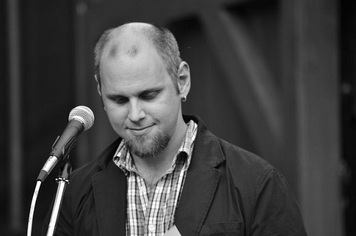 Gregory Betts
Gregory Betts Tom Cull: You are described as both an “experimental” and an “avant-garde” poet. Are these two terms interchangeable?
Gregory Betts: No, well at least not for me—and, furthermore, in some respects they are oppositional. For me, experimental means willing to try something totally new and risk failure. Avant-garde, on the other hand, refers specifically to writers who try to change the world outside their writing through their writing, who care enough about their society/community to want to lead it somewhere. “Come the revolution,” as Stephen Collis implores. The former looks inwards towards the form in relation to other kinds of writing and modes of expression and risks saying something that might well be incomprehensible. The latter looks outward towards the world beyond the page and takes a stand. To be clear, in most cases and for most people these terms are interchangeable and they get bandied about freely without much investment. They are used to refer to just about everything. So what I’m highlighting here is the thing that makes them both appealing to me especially in their difference.
Conversely, when “avant-garde” means something akin to “innovative” it’s just another boring substitute for capitalism. “Experimental” is too often synonymous with self-indulgence and poor editing. I’m not sure either term really applies to my writing: I don’t think I’ve been socially ambitious enough, as yet, to be called avant-garde, and though I fail and fail often I don’t think any of my failures amount to anything spectacular enough yet to really register on that other front. Kenneth Goldsmith recently failed in trying to make poetry out of police shooting victim Michael Brown’s autopsy report, and failed spectacularly. I’m not sure what he was going for exactly, but I condemn the casual cruelty of his appropriation of race. Like Frankenstein, it’s like he lost the human perspective in his pursuit of the experiment. The avant-garde and experimentation are interchangeable inasmuch as they are both well-littered graveyards of catastrophe and disappointment.
TC: Have you always written experimental poetry? What draws you to experimental poetry over more traditional forms of poetic expression?
GB: Hmmm… I suppose I see experimentation as part of the poetic tradition, indeed intrinsic to the kind of writing I care most about—and I don’t think “traditional” writers like Coleridge, Blake, or Byron or Atwood would disagree (though Tennyson would). When I work with permutations, for instance, I feel a connection to bpNichol and Brion Gysin and Robert Filiou and, more recently, to Angela Rawlings and Margaret Christakos. Is this so different from the ancient Sanskrit epic poem “Kiratarjuniya”, that contains loops, anagrams, repetitions and other language games? Perhaps the bigger split is between expressive and disjunctive writers. In Canada, ever since Phyllis Webb let air and space invade her page, silence has been thematized as an appropriate response to what the Situationists called “the present multiform crisis” of Western colonialism, imperialism, and capitalism. M. NourbeSe Philip more recently highlights the necessary task of letting language collapse for different but related reasons.
I am interested in writers that explore language as a problem as a metonymy of the boundaries of human experience, and especially those who then experiment in search of new portals to find a way out or at least to find a new elsewhere. If we want to expand the possibilities of the human, we need first to confront the limitations of our primary technology. Language is not just our point of access to the world, and to other people (or creatures or machines), but it is our principal point of contact with ourselves. Poetic expression that does not register the limitations of the tool it is using to reflect or pontificate on the world always seems too comfortable within the present world.
TC: You wrote The Obvious Flap (Bookthug, 2011) in collaboration with the poet Gary Barwin. Your internet poetry is also highly collaborative. What appeals to you about collaboration?
GB: Collaboration is exciting—you give up the very thing that most limits poems, the I-self, and yet somehow still learn from within the fold of your own production. It’s the schism of voices that creates a fracture, an opening to something disturbingly new. And you have to take responsibility for saying something that you would never say on your own. How delightfully disturbing! This is especially true when you work closely with a writer as inventive and open as Gary Barwin. My other collaborator was Facebook. All of Facebook is more conservative an imaginative space than Gary Barwin.
TC: I want to ask you about your two most recent books. First, This Is Importance (Poplar Press, 2013) is a collection of mistakes comprised from years of marking student papers. You preface the collection with an essay in which you celebrate mistakes as a necessary part of the learning process. Do you distinguish between mistakes that are born of trying and mistakes that are born of a lack of trying?
GB: In the context of an essay, while grading, that’s a rather subtle difference! In that project, especially, I was interested in inadvertent insights—errors that are so far off the mark that they reveal something completely otherwise (other-wise) by mistake. It’s the surprise and the misdirection that make them so appealing. What I realized, as I was grading papers filled with errors such as you’ll find in the book, was that I was not reading those papers with my poetry brain but with a rote, evaluative brain. How dull and limiting! And what a mistake! Keeping myself attuned to the poetry of the error is a way of making the grading process weird and wonderful. Also, I bring them into the classroom when I find them to talk about (after we have a laugh) what went wrong and how to learn from it. Humour and error are definitely a large part of my pedagogy, and how I learn things for myself too.
TC: Part of this process has to do with learning to laugh at our mistakes—to enjoy the humour of transgression. As an artistic form that champions transgression, why does poetry seem take itself so seriously?
GB: That’s a critique that Ryan Fitzpatrick and Jonathan Ball sought to address (and contest) with their recent anthology Why Poetry Sucks, a collection of very funny experimental poems. They make the subtle but important point that weird things have a pleasure in themselves, even before you get into all the serious stuff going on. Thinking about a fishchair or a carsoon or even completely made-up words (free words, my son calls them) is an invitation to imaginative play. The avant-garde is built on this kind of play. It becomes so so serious when that upriotous fun is aimed specifically against dominant values, but to me that just adds to the pleasure even as it grimly acknowledges the mess of the world.
TC: Your most recent book Boycott (Make Now Press, 2014) samples and assembles statements taken from boycott movements from around the world. What interests you about the concept and practice of boycotting?
GB: Well, ever since I was a kid, I’ve been involved in boycotting. I learned, over a cigarette behind my high school, that McDonald’s sold “100% Canadian beef” but that “100% Canadian beef” was actually the name of a company that raised cattle in the Amazonian rainforests. Nauseated, I have never stepped foot in one since, even though they have reversed that particularly egregious abomination. I’ve picked up a few more boycotts over the years, and, twenty years later, finally decided to spend some time investigating the tool and what I was actually participating in by boycotting. What I discovered was disconcerting: boycotts are one of the most powerful tools of progressive social movements (which is how I learned of them), but they are also the expression of enormous power differentials that reinscribe things I’m much less comfortable with. The book, thus, starts with boycott movements against the big powers and the leading economies, things most people are comfortable with, but gradually addresses boycotts against increasingly marginalized groups. There is an American-led boycott movement against Haiti for fuck’s sake! Boycotting, I have come to realize, is an ambivalent tool that can be used for good and evil. Ultimately, the ability to boycott only reflects one’s ability to withhold capital, which of course privileges those with the most capital. I’m implicated in those realizations.
TC: This Is Importance employs a more standard typographical format—the lines have regular margins, spacing, and categorization. Boycott, however, employs a wide spectrum of typographical variations. Both books are comprised of found poems; how, in each book, did you decide upon the arrangement of the lines on the page?
GB: In This is Importance, the semantic unit was the sentence. These were logical chunks that were kept in the simplest form possible in the book. In Boycott, though, a much more challenging work because of its varied ideological content, the form attempts to respond to and bring out key dimensions of each statement. The twists and turns of the line breaks highlight different stress points in the statements, forcing pauses onto revealing ideas in the language of global boycott movements. It also, I suppose, registers my basic discomfiture with the language I was tracking and including in my own book. Some of the lines are very, very funny, but there is a basic advantage they are all based upon that I am happy to see broken up and disrupted.
TC: Is it true that actor Shia Labeouf plagiarized you in his defense of earlier charges of plagiarism? Have you ever plagiarized Shia Labeouf?
GB: Yes, rather brilliantly in fact, in the context of an interview in which he was expressing himself only through quotes. It was quite a performance, reminiscent of Echo struggling to speak in the words of Narcissus. Only, in this case, the part of narcissism was played by all of Hollywood itself. I have to admit that it was only after some editors on Reddit discovered the plagiarism that I learned who Labeouf was. The whole ordeal was strange and weird in the way that only LA/Hollywood can get. He flamed out, backtracked, and became an eccentricity in a lulled American moment.
Speed round!
Tom Cull: What is your earliest memory of writing creatively?
Gregory Betts: I mowed the lawn, but one day mowed around an especially tall dandelion. My parents made me go back and mow it too. I wrote a dirge elegizing the flower. Earnest, rhyming, and pitifully lost in expressing over-wrought emotion.
TC: As a child, did you read poetry? Was poetry a part of your childhood?
GB: Just the usual things—Dennis Lee, Shel Silverstein, Dr. Seuss. In grade 1, I discovered the Greek myths and consumed them voraciously. I preferred novels and devoured the works of Marshall Saunders, James Herriott, and especially Richard Adams. When I was about 8 I switched over to more adult fare and ripped through Ken Follett, Dick Francis, Stephen King, Peter Straub, and the like. It was Robert Hunter, when I was 14, who turned me on to poetry. Ginsberg and Shelley became big influences at the outset.
TC: How did you become a writer?
GB: By publishing a book.
TC: Can you describe your writing process? How does revision figure into the process?
GB: I suspect I would do much better at this whole thing if I had a process. The only thing I focus on is the individual project and I try to do everything I can to fulfill its unique potential. I also make an effort to never write the same kind of book twice.
TC: What are you currently working on?
GB: Right now, I am just finishing up another collaboration with Gary Barwin, writing a book on the Vancouver avant-garde, editing a book of essays on Marshall McLuhan and Sheila Watson, finalizing a new scholarly edition of the first avant-garde novel in Canada, and digitizing the complete works of bpNichol.
RUSTY TALK WITH GREGORY BETTS
GREGORY BETTS'S MOST RECENT BOOKS
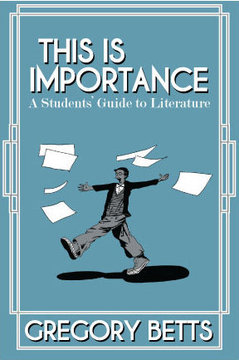
Gregory Betts
Wolsak and Wynn, 2013
Description from the publisher
Poet, novelist and teacher Gregory Betts has an ear for a well-turned phrase and an eye for captivating errors. In this highly amusing collection, Betts has pulled together some of the best misinterpretations of literature that he has come across in his years of grading papers. With an introduction on the importance of learning through error in education and a full complement of confusions on authors, styles and the point of reading literature, this book will delight English teachers everywhere.
Characters are all born in literary Canada.
Rising Action is the period before the climax where there is a build-up to prepare the reader
for the ultimate high.
The narrator is bias.
All literary devices die.
The average reader expects grammar and punctuality in every sentence.
Female protagonists take no heed to spiritual warnings.
The story is so complicated, so devious, that nobody could possibly understand it, let alone
me.
It is certain that there is no conclusion.
Writing is one way to control the truth.
An unreliable narrator is one whose recitation of the plot is strongly compromised because
of madness, blindness, or biasness.
The past tense represents an attempt to reflect on what has already happened to the narrator, such as future failure.
Realist writers have both feet grinding in the world.
Form causes everything.
The author speaks volumes in his novel.
The narrative is the experience of everything: everything that can happen.
A period in a sentence suggests death.
On Poetry
The poem begins with the poet’s language.
The poet attempts to salvage that which is beyond recovery.
Poetry has many complex dimensions: it can be revolting or disgusting.
Language makes the poem seem a certain way.
Seeing 4 lines per stanza makes you believe that it is a Quartrain.
Language is extremely useful to a writer.
A narrator is the unreliable voice inside a poem. We find this out at the very end.
On Reading
Reading is a painful experience, although pleasurable.
Reading creates a sinister impression of the imagination.
Readers tend to miss the deeper meaning of a text because they tend to focus on me.
Profound Forisms I
The author uses a forism to express a commonly held belief.
Beauty is temporary therefore one should procreate.
Mortality is the result of time.
The alphabet has been a major influence on many poets.
In general, poets are striving to generate taboos.
When lust presents itself as attainable, desperate bachelors act on the opportunity.
Reality is hard to live in.
School makes men dream of war.
Homeless people are undeniably alive.
Most people do not know that they fear what they do not know.
We know nothing of reality.
In conclusion, it is always important to know which work is being read.
Children are a stigma of innocence.
There is never a situation where coherency can exist.
Death can be viewed as a bad position. Perhaps the worst.
Exposition is the future before the flashback.
Literature is a very important mode of transportation.
Marxism theories the text.
I get a shady feeling from story telling.
Most people worry about customized babies.
It is difficult to bomb someone softly.
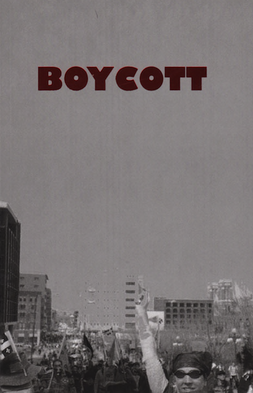
Gregory Betts
Make Now Books, 2014
The
word boycott originated in Ireland during the “Land War” from
the name of Charles Boycott, the agent of British absentee
landlord, Earl Erne, who was subject to social ostracism
organized by Michael Davitt’s Irish Land League in 1880.
We must send a clear message that human death, ecosystem
destruction, and collateral damage are unacceptable in the pursuit
of oil. We must use our dollars to vote against this type of
corporate behavior!
Gosh forbid they should provide full-time employment with benefits or a decent
wage.
I hate Ohio so much I made a website.
I'm not the
kind of gal
who cries
"boycott"
easily,
but staying in Thailand makes no sense for anybody.
I’ll take a great beer over cannabis any day, but I will boycott
Belgium-owned Anheuser-Busch. I’m not going to Belgium any
time soon.
I’m not going,
and I’m looking forward
to not going.
If you're from out of state, beware! Don't drive through Illinois.
It's a trap.
You Boycott Me
Will you boycott me upon reading this? will you boycott the response after reading
this?
I don’t care if you boycott me, or curse me and cause me supreme amounts of pain. If
you boycott me, you are only hurting me. I will be forced to suffer the consequences.
You throw me in the middle of the ocean, force me to live with tigers.
Where is my rights to express my freedomness when you boycott me? An average guy
on an average wage? How cartel of you.
Actually, I prefer it. But tell the truth: You hate Americans, period. Just be honest
about it.
If you boycott me, I will boycott isreal, and I am serious about this. think about that
before you boycott me. Tit for tit. This is collectivism. I will not send you any
electricity.
You boycott me. So at the end of it all. What really happens? Nothing.
Boycott Argentina for their sinful ways
Boycott Australia in retaliation for the country playing host
Boycott Austria and their tourist industry and buy your guns somewhere else
Boycott Bahrain? Boycott Oman? Boycott Iraq? Boycott Indonesia? Dream on... these
are American Client states. These are vital Customers
I say let's boycott Barbados altogether and all things Barbadian. And further
more, in protest, I refuse to even mention this nation by name
You say boycott Bolivia? How about the rest of the world boycott you?
I boycott you who boycott girls, without girls, you cannot exist
and I boycott you Canada!!!
Really, Pampers? Must I boycott you too?
I boycott you blog that is full of shit.
I boycott you because I hate ads that much.
I boycott you illiterate Facebook applications.
The reasons I boycott you? At first, it was simply because it was so hard.
Here’s my question: should I admire you for sticking to your unnecessary, overtly
sexual guns or should I boycott you because of, um, the same reasons?
How can I boycott you when I never darken your doors to begin with?
I boycott you Naomi Klein. This comment has received too many negative votes to
show. Click hide.
I boycott you because you are so ignorant that you are mixing art and politics
together. Get a crash course on Art 101!!
When Chavez is removed, then the boycott can end, but not
before. T-shirts till the end.
If heaven is a place on earth, hell is in Norway.
If it’s so great there, why do they speak Norwegian?
As Americans if we allow ourselves to be treated like offal by
these corporate tyranists then are we not also ready to accept
tyranny as our form of government?
RUSTY TALK WITH GARY BARWIN
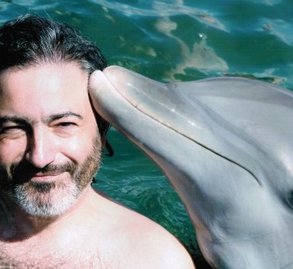
Other recent books include Franzlations (with Hugh Thomas; New Star), The Obvious Flap (with Gregory Betts; BookThug) and The Porcupinity of the Stars (Coach House.) He was Young Voices eWriter-in-Residence at the Toronto Public Library in Fall of 2013 and he is Writer-in-Residence at Western University in 2014-2015. Barwin received a PhD (music composition) from SUNY at Buffalo.
Barwin is winner of the 2013 City of Hamilton Arts Award (Writing), the Hamilton Poetry Book of the Year 2011, and co-winner of 2011 Harbourfront Poetry NOW competition, the 2010 bpNichol chapbook award, the KM Hunter Artist Award, and the President’s Prize for Poetry (York University). His young adult fiction has been shortlisted for both the Canadian Library Association YA Book of the Year and the Arthur Ellis Award. He has received major grants from the Canada Council and the Ontario Arts Council for his work. Recordings of his work can be found at PennSound.org and on his YouTube channel. He lives in Hamilton, Ontario and at garybarwin.com.
Kathryn Mockler: What is your first memory of writing creatively?
Gary Barwin: I was a single cell. There was a flurry of macromolecules—DNA, RNA, a wad of proteins—and then I wrote another cell into being and I became two cells. I kept writing until I was millions. This was my mother tongue before I had a tongue. There was no editing, until my father cut my nails.
Unless, my first creative writing memory was when I was 6 and writing on little cue cards, making up a writing system that seemed to hold the largeness, the numinosity of what could be said. I wrote a bunch of strange little sentences that were spells or poems in this made-up script that didn’t “mean” anything. And I do remember writing “Cosmic Herbert and the Pencil Forest” a short story in Grade 5 and publishing it to sell at the school “White Elephant” sale. My first publication.
KM: You are probably one of the most diverse writers in this country. You are a poet, a fiction writer, a children’s author, a performer, an artist, and a musician—is there an art form that you have not tried but want or plan to? And how do you decide what genre or form a project will take?
GB: There are so many things I’d like to try. I can’t help wanting to try my hand at a variety of things. I feel that there are so many exciting and inspiring ways to imagine writing, how could I just settle on one?
I see a continuum of approaches to creative work. On one extreme, there are writers like Samuel Beckett who worked his entire long career on narrowing the focus of his writing until he arrived at the laser-like minimalism of his later work. And then there are the writers who explore many different modes of creation, all part of one big messy creative ecosystem. bpNichol was one of these. The composer/writer/visual artist/performer John Cage was another.
As for me, I am currently working on a multimedia piece that will involve sound poetry, spoken text, computer processing, live music, recorded music, video, visual poetry and dancing giraffes. Ok, I’m lying about the giraffes. They won’t be dancing. Unless, of course, they want to.
The whole shebang is inspired by the work of iconic Canadian writer of “borderblur,” bpNichol and uses archival recordings of his performances. So I guess the answer is, I’d like to explore ways to further combine my various interests. I’m also also really interested in exploring film. I’ve made a few short videos by myself and in collaboration and I’ve found it very inspiring. And I’d like to work with various kinds of computer processing of text—I mean beyond spell check. There are so many fascinating things that can be done with even simple programming tools to create interesting texts or interactive text-experiences. I’ve done a few, but I’d like to explore this more. I find these kinds of projects really amazing and attractive.
I’m also planning an art exhibition of my visual poetry work, which is something I’ve wanted to do since crayons.
In terms of how I decide what genre or form a project takes, it is like cell division. I start with one tiny bit of something and then try to follow what it wants to develop into, trying to be open to what it might be. Or sometimes, I consider a form or a genre and think, “Hmm. I wonder what I could do with that? What possibilities does it offer? How would it make me create something that would surprise me or take me away from myself and my usual way of doing things?”
KM: You’ve been very involved in the small press and chapbook scene as a writer and publisher. Can you tell us a little bit about how you got involved and how that community impacted your writing and publishing life?
GB: It’s probably terribly gauche to do this, but I’m going to shamelessly plagiarize an answer to this question that I gave in an interview with the writer/scholar Alex Porco a few years ago in OpenBookToronto.com. I could, like a student once told me he did with stolen essays, run it through Google translator, first changing into Chinese, then Urdu, then back to English so that it becomes an “entirely new essay,”—actually I do do that with some poems to see what interesting changes occur—but here’s my original answer in the original language, rejigged just a little bit:
I’ve been involved in the small press since 1985. In a creative writing class at York University, our professor, the brilliantly laconic and insightful Frank Davey [who then went on to teach at Western], told us about this event downtown called "Meet the Presses", a gathering of small presses devised by Stuart Ross and Nicholas Power. He encouraged us to create books and get a table. I did, and ended up attending both Meet the Presses and independent book fairs for the next thirty years publishing a series of broadsheets, chapbooks, and various ephemera for each event. Stuart, Nick, plus some others of us, re-formed Meet the Presses several years ago in order to create the Indie Literary Market. These kind of community-based writer/publisher events, along with readings and the online world have been a constant and important part of my writing and cultural life. They’ve really contributed significantly to my development as a writer and have been responsible for introducing me to many writers, publishers, friends, acquaintances, colleagues, and readers, and much writing which has been important to me. All of which made my last thirty years of engagement in the literary scene inspiring, collegial, pleasant, welcoming, intellectually engaging, and fun.
I see small press publishing and related events like the [Toronto] Meet the Presses Indie Literary Market as responding to, and facilitating community around literature and publishing. The technology of the book is not one merely of information technology, but interactive technology. Readers, writers, and publishers come together to share their joie de livre in a context that is outside the strictures of predominantly market-driven publishing. In the small press, we can turn on a dime because we don’t need thousands of dollars to continue. Our share-holders are people who share in our work by holding our publications in their hands, and share our mutual appreciation of independent literature and publishing.
Publishing is not a neutral act. It is implicitly political and aesthetic. The publishing is part of the aesthetic of the work, in terms of its look, its distribution, and how the audience interacts with the work, both in terms of reading it, engaging with its writers and publishers, and in how it finds its audience. In the small press, there is a reason, a conscious decision, to publish the works in the way that they do. The presses choose to publish in this form not because they have to, but because they want to. In this kind of publishing, success is defined as an authentic interaction between engaged writing, publishers, and readers. It’s good to be reminded that we can choose to shape how our writing is and not only be driven by market-, media-, or other social forces. And we don’t have to wait for these outside forces in order to begin to publish and create audience and to make the writing and the community that we wish to see.
KM: What is the best piece of writing advice you’ve been given that you use?
GB: bpNichol (who I’ve now mentioned several times) told us in writing class, “to keep writing.” I think that’s wise. Implicit in this, though, is to keep being curious and exploratory in one’s writing. Not to keep writing the same thing or the same way, but to keep trying to get better, to keep actively considering what makes writing exciting and interesting, what works and what is possible. And one can’t write without being an active and engaged reader, and, for most of us, unless we’re Emily Dickinson, an active participant in a literary community. I also remember asking Lillian Necakov, the first one of my friends to have a book published, how she did it. She said, “You write one page and then you write another until you have a hundred pages. Then you have a book.” Also good advice!
KM: Collaboration seems to be a big part of your writing and creative life. You’ve collaborated with Craig Conley, Hugh Thomas, Gregory Betts, Derek Beaulieu, Stuart Ross and others. What draws you to collaborative writing? I’m sure it depends on the project, but how do you approach it?
GB: I first make it clear that I’m the better, more experienced part of the collaboration and that everyone should take their cues from me. And bring me coffee. Also, I’ve got this itch just an inch below my right shoulder blade and …
But, really, the excitement and fun of collaboration is being open to doing something different, to this strange hybrid, hydra-headed process that is collaboration. It is both and neither of the participants’ work. It is very freeing. It is my work, but it isn’t, so I feel even more empowered to try things, to go with the process, to go outside my own sense of self, or my sense of my identity as a writer or even, my sense of what works as a writer. I try to trust the process that happens between me and my collaborators. And the great secret of writing is that you can always change things—tweak, modify, revise.
Sometimes collaborations involve some planning ahead by discussing what the project will be; sometimes, it involves just jumping in and seeing what results. Sometimes, it is like playing tennis. One person serves up something that the other has to return. This can be a line, a paragraph or something else. Then the other person answers it. The answer may involve reframing the entire question, surprising, challenging, or confounding the collaborator. Sometimes we proceed line by line, stanza by stanza, or paragraph by paragraph. Sometimes each of us goes back and changes what has been written before. One thing I love about collaboration is that the act of collaboration (the ‘rules of engagement’) are created collaboratively and can change at any time.
KM: In addition to being one of the most diverse writers in Canada, you are also one of the most prolific. In 2014 you published the poetry collection moon baboon canoe with Mansfield Press, you have collection of short fiction, I, Dr. Greenblatt, Orthodontist, 251-1447 coming out in 2015 with Anvil Press, and you have a novel Yiddish for Pirates forthcoming in 2016 with Random House. How are you able to write so much? Can you give us a sense of your process and how you move between so many different projects?
GB: I was going to write a self-help book “Making Procrastination Work for You!” wherein I describe how one can harness the power of avoiding working on one project by working on another, but I didn’t get around to writing it ...
I do find that I get energy from jumping from one kind of writing to another. Prose reminds me what poetry can do and vice versa. Sometimes, though, I do need to burrow deeply into something to give it time to develop—this was certainly was the case with the novel—but then after a long writing session, or sometimes intermittently in the middle of one, I’d write something else as a palate cleanser, on a lark as a diversion, or as a kind of footnote to the main project.
I think I write a lot because writing serves many purposes for me. It is a way of figuring things out, a way of working through things, a way of knowing, of experiencing things, of exploring. It is an entertainment, an obsession, a mode of social engagement, of doodling, of spiritual practice, of trying to become a “better” (more thoughtful? more compassionate? more observant?) person, a way of creating, experiencing, and responding the energy and possibility around me and in language.
In terms of process, I don’t know that I have a single mode of creation. Often it is the slow accumulation of work, chipping away at ideas or larger forms. I don’t know where I’m going. I have a place where I start writing, but I always consider that the writing knows more than me so I trust the process of writing itself and where it is taking me rather than my ideas for the project. I try to listen to where it is going. I means lots of revision and recalculating.
For example, I had some ideas about the novel and where it might go. I even had charts! But they were flexible. I’d head to where seemed the most promising direction. Then when I got there, I looked around to see where next: which was the most interesting direction from this new perspective. And so I kept moving forward. You know that nursery rhyme, “The Bear Went Over the Mountain to See What He Could See?” That’s how I imagined it. I’d walk to the mountain to see what I could see. And then when I got there, I’d look to see if I could see the next mountain from where I’d be able to see what I could see. Until 115,000 words later, I felt I was done.
KM: For readers who are first introducing themselves to your work, moon baboon canoe might be a good place to start because it’s a great example of the scope of your writing. The poems in this collection are humorous, nonsensical, profound, personal, absurd, political, and experimental. It’s a goodie bag of poems where each one offers a new surprise. How did this collection come together? Was it written over a long or short time span?
GB: Thanks for your kind words. Though I do like books organized around a central idea or theme, I also like books that are, as the pirates say, a salmagundi, a mish-mash. In moon baboon canoe, I hope that the various kinds of poems offer an energetic and/or supportive contrast.
I had lots of different kinds of poems kicking around, but Stuart Ross, the editor, and I discussed what kind of a book this might be and so I gathered the appropriate poems together. I shaped the book into sections so that it wasn’t just a big blob of stuff, but rather several smaller more shapely blobs. (That’s like choosing what clothes to wear…) It is a bit like creating set-lists for a band. You shape each set so that it has variety, coherence, and a certain shape or direction. And then you smash all the instruments and jump into the audience. And destroy your hotel room. Oh sorry. That was only when I was in that string quartet.
Most of the poems in moon baboon canoe were written in the few years preceding the book and then intensely revised, both before I submitted the book and after consulting with Stuart. Knowing that it would be Stuart who would be looking at the book gave me ideas about revision. I could internalize some of what I thought he might say which enabled me to see the poems with fresh eyes. And then, of course, when he did actually did see it, he did have some comments and suggestions that I hadn’t thought of. I actually love the process of working with a good editor. It is a productive dialogue and a chance to not only fix problems, but to learn of opportunities to make the writing do more. I didn’t always take Stuart’s exact suggestions, but I did listened carefully when he pointed out weaknesses or flabby bits which I could rework, revise, and generally improve.
As I said, most of the poems were written in the last few years, however, there are a couple that come from a long time before that. One of them I wrote as an 18-year-old undergrad. I was quite chuffed at the retroactive validation, that, at least, as far as that poem went, I wasn’t as entirely clueless as I thought I was back then.
KM: One of the things I enjoy most about your poetry is your sense of humour. In the poem “inside” which starts with the lines “inside Stephen Harper / there’s a little dog” you marry humour and politics into a thematically satisfying and entertaining poem. Poetry often has a reputation as a serious art form. When I talk to writers and readers new to poetry, they are surprised when poetry is funny. Can you discuss your thoughts on humour and poetry? Who are some of your influences?
GB: I don’t know why poetry and humour should be thought of as antithetical. Or why humour and “profundity” or depth should be thought of like oil and waiter, Angelina Jolie and Don Cherry, or iPhones and the duodenum. I think of humour as one of the great resources of communication. To surprise, confound, reconfigure, challenge assumptions, to enable lateral thinking, and more complex perspectives. Many traditions recognize this. For example, the spiritual masters who wrote Zen koans, Sufi parables, or Three Stooges shtick. And English: what a delightful narrative of confounding syntactic jokes, slippery orthographic pratfalls, and historic and lexical legerdemain.
two roads diverged in a yellow wood
I took one
it doesn't matter which
I'm not giving it back
Thinking specifically about humour in poetry, my influences from contemporary poetry include David W. McFadden, James Tate, Stuart Ross, Ron Padgett, Lisa Jarnot, Mark Strand, Steve McCaffery, and I’m going to have to mention bpNichol again (and here, I’m thinking of his sly visual work.) I think I’d also have to include John Cage and Wallace Stevens, More recent influences would include Anne Carson, Gabriel Gudding, Mary Ruefle (do you know her amazing lectures, Madness, Rack, and Honey?) Heather Christle, and Dorothea Lasky.
KM: You’re the 2014-15 Writer-in-Residence at Western University. You’ve been very present on campus with various initiatives such as Flashbang—a speed-editing event and Reclaiming the Corridor of Excellence: A Public Performance in which you will be exhibiting curated works in the new Arts and Humanities building. What have you got planned for your second term?
GB: I plan to sleep in my office under a pelt made from actual Irving Layton. Unless it’s Naugahyde. And then, I’m doing a few readings including at the London Open Mic, another Flashbang event at the Weldon library which will involve text performance and music, and a multi-media event in conjunction with Josh Lambier’s Poetry Lab.
I’ll also do another Flashbang speed-editing event (like last time, with student-writer-in-residence Steven Slowka), and some kind of live performance as part of the Corridor of Excellence project, though I haven’t figured out exactly what yet. As part of the London Public library part of the residency, I’ll also be doing a speed-editing event there, and workshops for seniors, for street-involved youth, and at the London Writers Group. This is in addition to visiting various classes and holding individual consultations during non-Layton-coated office hours.
KM: What is your favourite or funniest literary moment, if you have one?
GB: When one of my sons was about three (N.B. Ryan: don’t worry I won’t say which son), I took him with me to a reading that I was giving. As I went up to the podium and opened my mouth to read, he ran up, grabbed all of my papers and threw them across the room. Then he exclaimed, “No. I am the writer!” After I gathered my papers, I began to read again. Then he squatted in the corner and shouted, “I HAVE TO POO!” I actually thought the whole thing was quite funny. Why? Was it my Dadaist-Fluxus-anarchist son destabilizing the conventions of the bourgeois reading via a Freudian intervention, or just whacky madness that reminded me not to take things so seriously? Either way, the mostly university-age non-parents were pretty shocked, though the parents thought, “Oh yes, just another Thursday night.” I didn’t bring my son along to another reading until he was much older. Now he’s a musician in Toronto, but I haven’t staged a similar intervention during one of his performances … yet … my son and I have performed together quite a lot in a variety of situations, both literary and musical.
And then there was that time that I was driving across the border to read in Buffalo and the border guard, on hearing that I was a poet, read me her (really awful) poetry for ten minutes as the cars lined up for miles behind me.
Thanks very much for the questions. I really appreciate it.
For our London, Ontario readers who would like to make an appointment with Gary Barwin at Western (between now and April 2015) contact Vivian Fogloton in the Department of English and Writing Studies.
GARY BARWIN'S MOST RECENT POETRY BOOK
MOON BABOON CANOE
MANSFIELD PRESS, A STUART ROSS BOOK. 2014
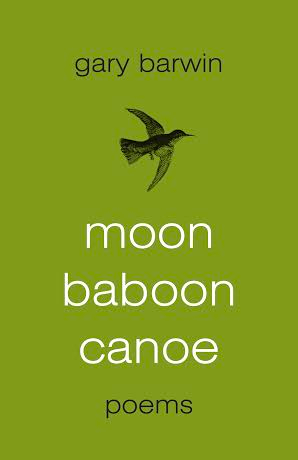
A follow-up to his acclaimed The Porcupinity of the Stars, Moon Baboon Canoe is filled with Gary Barwin’s trademark humour, invention, musicality and craft. These witty and surprising poems confront subjects as diverse as time machines, elves, hummingbirds, birth and cows, yet manage to explore the perennial themes of poetry: delight, mortality, childhood, love, the natural world and squirrels. It is a moon-guided, baboon-paddled canoe of a book, and around each bend in the river we find the sources of our strength: consolation, goofiness and joy.
Kathryn Mockler is the publisher of The Rusty Toque.
RUSTY TALK WITH DANIS GOULET
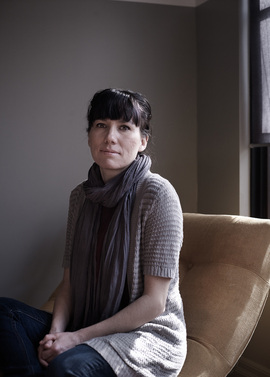 Danis Goulet
Danis GouletPhoto by Clay Stang
Michael Vass When did you first become interested in films, and how did you get into filmmaking?
Danis Groulet: I've been interested in film since high school, and I started off working in casting on films like Mean Girls and Love That Boy. After a few years, I began to experience a growing disillusionment with the projects that I was hired for. As a young Cree/Metis woman, I was becoming more and more aware of how pervasive the misrepresentation and under-representation of Aboriginal stories and characters on screen was in all aspects of the screen industry.
Shortly after I moved to Toronto from Saskatchewan, I found myself in an audition room for a big US television pilot. The opening scene was an Indian Princess who silently sacrifices herself over a waterfall. That day, the most talented Aboriginal actresses in the city, who I greatly admired, were called in to audition. One by one, they walked into the room, and instead of being given an opportunity to shine, they were literally silenced, reduced to a re-enactment of a noble sacrifice. I still remember the powerful image of their faces in silence. As the casting session continued, I sunk deep into my chair in shame at the thought that I was the person behind the table, supposedly representing part of the team putting this out into the world.
Spurred by that experience, the penny dropped for me: we had to make our own films. I wish I could say that directing had always been a calling. But it was more of a sense of feeling implicated to try because there were so few Indigenous filmmakers out there around that time. In 2003, I made my first short film spin and absolutely loved everything about the process. I also attended my first imagineNATIVE Film + Media Arts Festival. By the next year, I was running the festival and was immersed in the Indigenous film community.
MV: Is there a filmmaker or writer (or more than one) that has been a particularly significant influence on your work?
DG: I think for Barefoot, I was profoundly influenced by the films of Andrea Arnold. I still remember completely freaking out after seeing her short film Wasp at Sundance in 2005. Her films are brave and uncompromising, led by female characters who also seem to be enigmas onto themselves. I loved Red Road as well.
MV: What is your favourite part of the filmmaking process?
DG: The adrenaline of shooting. I love the choreography of all of the elements and the immediacy of it. It demands that you completely face every moment with your eyes as open as possible. The closest experience that comes to it for me is being in labour!
MV: Where did the idea for Barefoot come from?
DG: I saw my little cousin's Facebook update that said: "At 21 weeks, your baby is about the size of a carrot." This is how I found out that she was pregnant, and she was in her last year of high school. The film is set in northern Saskatchewan where I was born and spent my childhood. My cousin's update got me thinking about how normal it is for many Aboriginal women to have kids at a younger age. There are very few options for girls growing up on the reserve and they face incredible challenges. It is logical to me that motherhood would be seen as a great option for a young woman. It was important for me to situate the film from the perspective of a girl who wants a baby more than anything else and sees this as her future, and outside of the values of a more mainstream middle class perspective that might judge teen pregnancy.
MV: In Barefoot, and in other films, you have used non-professional actors—can you talk about why? How is the process of casting, rehearsing, and directing non-professionals different from working with experienced actors?
DG: I started in casting, so have always had an enormous respect for actors and the importance of performance to any film. However, at some point, I decided that I wanted to move away from all of the filmmaking "shoulds" to just experiment with the process and see what might happen. Working with professional actors was a golden rule for me, so deciding to work with non-professional actors was a way to break one of my own golden rules to see what would happen—and it was incredibly liberating. With non-professional actors, you still ultimately need to find performers, and I can honestly say that all of the non-professional actors in my films (including some members of my own family) are fantastic performers.
In Barefoot, we also built a huge amount of rehearsal time into the schedule. We did five days of rehearsal and five days of shooting—which is a huge rehearsal ratio for film. We chose ten teens out of 200 from northern Saskatchewan to work with us for five days, and we cast the leads on the 4th day of rehearsal. I worked with a couple of experts in Forum Theatre, Warren Linds from Concordia and my mom Linda Goulet who works at First Nations University. They used theatre methods to work with the kids for the first three days, and it was incredibly powerful. I ran quite a lot of improve—we didn't really rehearse any scenes from the script but focused more on opening up and becoming comfortable with the process and with one another.
We also had an Elder present for the whole rehearsal, Ida Tremblay who plays the grandmother role in the film. The kids went through a lot over those five days, and they all had a lot going on at the time. Her presence was important to the film, it made the kids feel safe, and they could talk to her at anytime if they needed to.
MV: What are you working on now?
DG: I'm writing my first feature, which is set in a dystopian future. I'm hoping to get my next draft off before Christmas. I'm also planning to shoot another short film set back in my hometown (same as Barefoot), but this time in the 80s at the rollerskating rink. It's based on my summer grade five crush on the skinny guy from the far reserve. I'm not sure how much hairspray will be used in the making of the film, but I'm pretty sure that it will be a lot.
WATCH DANIS GOULET'S FILM BAREFOOT
IN ISSUE 7 OF THE RUSTY TOQUE
| About Barefoot In a tight-knit Cree community in northern Saskatchewan, sixteen-year-old Alyssa’s plans to become a mom begin to unravel. To learn more about this film visit the Barefoot website. |
Michael Vass is filmmaker and writer and a regular contributor to The Rusty Toque.
RUSTY TALK WITH ALEX LESLIE
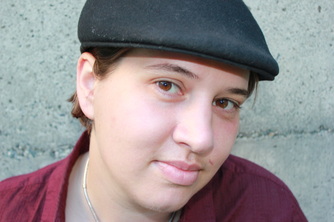 Photo by Lorraine Weir
Photo by Lorraine Weir Alex Leslie: In kindergarten, there was an assignment to write a riddle. For whatever reason, this assignment became a kind of obsession for me. I remember writing more than the required number of riddles and then having to choose between the riddles. This was a Sophie’s Choice situation for five-year-old me. One riddle I wrote was “What travels all over the world but is always in the same place under foot?” I was very adamant that underfoot was different than under foot and I remember the arguments from my classmates that I was “cheating” and that this was “unfair.” It stays under your foot. The answer was the sole of your shoe. Apparently, the sound/word under foot could not be used in this tricky, ungrammatical way and I was a cheater. I have memories of hiding under a table.
One other riddle involved a gun; I don’t remember the riddle, just that it involved a gun and that this was “disturbing” and that this riddle was quickly disqualified by the teacher. No weapons; no messing with portmanteaus.
After this, I began to write stories about our neighbours as caricatures, for example “Liora the Witch.” I had no mercy. I also was convinced that I was the most hilarious person on the planet, which helped. Then I wrote longer and longer things, all fiction. I was always working on writing projects through elementary and high school. But thinking back, the riddles were the beginning. I was going to write the best riddle. I just wanted to write a really hard riddle so that I could have the opportunity to tell everybody about my clever word game. I do not recommend this social strategy to today’s kindergarten students. The world needs you to survive.
SJS: What is your writing process like? (How often do you write? Where? When? Etc.)
AL: My life is currently deeply split between graduate school and my writing practice. My degree is not in an artistic or literary field, so there is some measure of separation there, which is good. My writing process is that I write things in series, to sustain momentum and motivation; writing things in series is very helpful when there are other forces in your life. It gives you a thread to hold onto through everything else. I carry around a notebook that I write helpful ideas and phrases in. I also tend to write myself emails on my iPhone, so I receive lots of emails about scenes and phrases from the Gmail sender “me.” Me sends me lots of cryptic random stuff. If “me” were not me I would be concerned. When a piece reaches a certain stage, I print it out and carry around a copy that I mark up with notes. I only work well when my process is very organic and disorganized and I have succumbed to the fact that this is just how it goes and eventually I get somewhere without really noticing.
I don’t have a specific time of day when I write; late at night works and in the summer I often wrote in the morning, when I didn’t have classes (but who are these schedule-less writers who can write all the time at their ideal time?). I do have a workspace in my home, which helps. I would like to add that other writers are part of my process. I’ve been workshopping with poet Adrienne Gruber for several years. Her next book is out with BookThug and her chapbook Intertidal Zones is just out with Jack Pine.
SJS: How do you approach revision?
AL: Revision is my favourite part. I print it all out. I carry it around and cross things out. I write things in. I prune. I fiddle. It is like having a bonsai tree in your backpack that only you can see. I obsess. I remember reading an interview with Michael Ondaatje (whose early experimental fiction such as Coming Through Slaughter is very important to me) that writing a novel is like building an imaginary city in your backyard. Yes, that’s what it’s like. Revision is great but there is a sense of loss when the book is done. Then you go on to the next thing.
SJS: When you started writing your latest book, The things I heard about you, did you write each poem with the intention of making it into a collection or did it happen more arbitrarily?
AL: This project began because of the line “I know how small a poem can be” by John Thompson from Stilt Jack. At that point, maybe three or four years ago, I was struggling with the short fiction form—the need to “conclude” and have an “arc” and what I can see now as the usual post-first-book anxiety about the form that created you—and the phrase “I know how small a story can be” came to mind. It took me a while to arrive at how to begin this process but I started to write vignettes or prose poems around certain intense experiences/events/scenes; these pieces were based on photographs. I then did a “blackout” process whereby I wrote increasingly “smaller” versions of these pieces of text. So the method always was what connected the pieces in my mind. No, I didn’t intend to make a collection of these pieces. It was a project that interested me on a technical level as a writer of stories/poems/cross-genre things. I wrote these pieces until the process lost its purpose or interest for me. The technical process of literally breaking down texts helped me to find language in my descriptions that I hadn’t been aware of, to become more aware of my own rhythms of writing, and to uncover connections in the pieces that I hadn’t seen before. This process taught me a lot about myself as a writer.
SJS: The poems seem to deal with a monumental sense of loss juxtaposed with a sense of freedom and hope. How did these themes, or others, influence the stylistic decisions for the book?
AL: Thank you for that reading. I didn’t consciously choose those themes for the book. I think that many of the pieces explore space in a layered way, in particular the coast and the structure allowed me to reflect different aspects of environments. I would also say that relationship is a theme in the book; there are several pieces about taking apart another person, or considering the different parts of them. I do think that the pieces that deal with loss, in particular grief, move to a place of release (the word I would swap in for “hope”) partly through the structure, because the structure demands that the original text shrinks, has the heavier parts lessened, discovers the more concentrated parts of itself. I’m glad that produced a sense of freedom or hope in your reading.
SJS: How did you approach the poems as a collection? Did you mean for them to have a narrative or was it purely coincidental?
AL: In the end, I ordered the pieces for pacing, both in terms of more intense pieces being spaced out. I am curious what narrative you found in the pieces overall? Do you mean a story narrative? Or a narrative created by the evolving form of the pieces?
SJS: The narrative I am referring to is definitely emphasized by the evolving form of each piece (which is actually quite beautiful, I might add). I think perhaps the kind of narrative I am talking about is more of an "emotional narrative" that runs through the book. In my interpretation, it is this back and forth between things, or people, that are lost and found. Where do these ideas come from? What inspired you to write these poems?
AL: I like that idea that it is a movement between things that are "lost and found," because I like to read the poems as fluid components rather than being something static, like different steps on a staircase. Several of the poems that centre around loss do speak out of losses in my life over the past five years. In particular, the piece in the collection "Knockin On Heaven's Door" is about the intense, initial period of grief and the (I think common) coping strategy of immersing oneself in music, placing technology as a barrier between oneself and the world during a time of grief. The way that the structure of the poems, moving from large or "monumental" as you put it to small or specific or minute for me mirrors in a way how this can be the experience of loss or grief—that there is something huge/intangible/incomprehensible but in the end what we remember is the specific sound, place or detail. I think that remembering detail is a way that we cling to our experiences; it was *this specific* shade of colour, it was *this specific* kind of laugh*, it was cold out, it was a Tuesday. Once I described this project to a friend and she said, "Oh, I don't think those are miniatures, those are needle biopsies" and I found that very apt. It can be a painful process to extract or uncover.
SJS: In the notes and acknowledgments section of the book, you mention that there was a last minute title change from I know how small a story can be to The things I heard about you? What prompted this change?
AL:
(a) I know how small a story can be is a cumbersome title
(b) I was embarrassed by how self-important it sounds
(c) Smug?
(d) Sometimes a title is the name of the Microsoft Word Document you made and it isn’t actually the title of your book. It is important to know the difference.
(e) A title can take you through a process as a touchstone for your process, but you need to move on from it when you need to, like a name that doesn’t fit you anymore.
SJS: What are you working on now?
AL: How to stay balanced while a full-time grad student and a writer.
How to not be overtaken by institutional environments.
I’m working on two projects.
My collection of stories People Who Disappear was published by Freehand a couple years ago and I’ve been working on short stories since then. One, “Stories Like Birds,” you can read online at Lemon Hound. Another, “The Sandwich Artist,” will be in Prairie Fire soon. The collection is coming together. It’s called We All Have To Eat. Stories take me a long time.
I’m also working on a collection of prose poems/experimental prose pieces called Vancouver For Beginners. These are pieces that look at Vancouver, my hometown, from many fractal perspectives. It’s inspired by texts like Invisible Cities by Italo Calvino and feria by Oana Avasilichioaei in terms of how they approach the city as an imagined space. Some pieces from that project have been in EVENT, The Capilano Review, filling station’s issue devoted to experimental writing by Canadian women, Dreamland, and Descant. A piece from the project will be in Best Canadian Poetry In English 2014, edited by Sonnet L’Abbee, with Tightrope Books, an anthology I’m proud to be part of. It’s out in November.
I’m also working on another fiction project that at this point is mostly research; that one will take a very long time.
ALEX LESLIE'S MOST RECENT BOOK
THE THINGS I HEARD ABOUT YOU
NIGHTWOOD EDITIONS, 2014
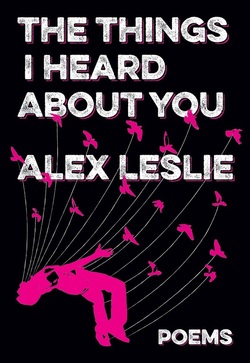
Shortlisted for the 2014 Robert Kroetsch award for innovative poetry, The things I heard about you is an exploration of precision and the unspoken, executing a process whereby vignettes and scenes break apart into fragments, rumours or suggestions of the original story. When stories decompose or self-destruct, the results vary, producing an effect of texture and syntactic transformation. This is a book of tidal memories and elegies, love songs to the coast and all its inhabitants. The things I heard about you is Alex Leslie’s debut poetry collection.
"Prose poems, soundtracks, minifictions—the lyrical, multi-faceted pieces in The things I heard about you record the ways in which language makes and unmakes us. 'Between a tooth and safety,' bodies, weathers, genders inhabit and are inhabited by histories of loss, institutions of violence. These stories don't shrink even as they grow smaller; each is distilled to a potent drop that sinks into the mind like ink into skin: 'I, not here, write.'"
—JEN CURRIN
VANCOUVER LAUNCH
TORONTO LAUNCH
MONTREAL LAUNCH
Visit Alex Leslie's website here.
Check out Alex Leslie's poems in Issue 6 of The Rusty Toque.
RUSTY TALK WITH SALGOOD SAM
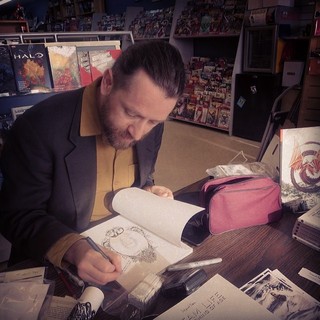 Salgood Sam
Salgood SamPhoto by Niall Eccles
Trevor Abes: What’s your earliest memory as an artist and storyteller?
Salgood Sam: For me there isn’t a conscious time before art, because my mother did it. She did illustration, commercial design and a little cartooning, and today she does storyboards for animation. My stepfather and two of my great uncles were also cartoonists. The idea of being a comics artist happened in high school. I walked into my home room, and a friend of mine, George Todorovski, was inking a comic on a light table. That was the moment when I said, “Yeah, I can do that.” I didn’t consider myself a storyteller yet, because I was dyslexic and I avoided the manual exercise of writing, but it’s part of my personality to have my own stories. I was in my mid-twenties when I came into my own as a writer and realized I wasn’t happy just drawing a picture.
TA: You got your start in comics in the 1980s by publishing zines and you’ve crowdfunded to great success. What advice do you have for budding artists with stories they want to tell on their own terms?
SS: If you want it bad enough and you’re willing to do the work, go for it. Don’t expect anything to be handed to you. Grants are less stressful than crowdfunding, because you fill out the application, send it and forget it. You don’t have to worry about delivering a finished product to customers. The flipside is crowdfunding is better for a storyteller to build a readership. If you’re getting started, I’d recommend both with those caveats. The new kid on the block I’ve been researching is Patreon. It’s a subscription service and you pay either monthly or per post. You have to have reasonably substantial content on a regular basis for people to pay a monthly fee, but Patreon lends ongoing support, not only financially but as a publisher.
Personally, I’ve never treated my creative work as an option. Since my early teens, I’ve approached it as work, no conditions. There’s a lot of pressure, it’s more stressful than I would like, and I think that’s what drives a lot of people away. They like to just enjoy art and hopefully someday it makes money, but for me that’s a foreign idea. I never made art only for fun. I definitely liked it better when it was just for fun, but it was never done with only that intention. It’s always been art and commerce. It’s a tougher road, but it’s the only way to go if you want to do it all the time.
TA: You began freelancing at Marvel Comics in the early 1990s, a period when the company kept its doors—though not so much its mind—open to new artists and new characters. How did this working environment help you become the artist you are today?
SS: Marvel was hunting for young talent. They’d done really well with people like Rob Liefeld and Todd McFarlane, and when I came along, those guys had just broken off to start Image Comics. I think Marvel liked a young person coming in who was more malleable and had less ideas about what they wanted to do. I didn’t fit that profile, which is why there was friction. They wanted fresh blood in theory, but in reality they didn’t want to change how they did things. They pushed more toward action sequences. Every time I tried to have a conversation, I’d be told I didn’t know what I was talking about. One of the problems that came up was with the first issue of Saint Sinner. They stuck gimmicky foil embossed covers on it, and I had a series of arguments with editors about how this wouldn’t attract a dedicated readership. They told me not to worry, we know this’ll work. Almost a year later, I received a gratuity cheque for four thousand U.S. for the sales of Saint Sinner #1. Then, six month later, I was working on a job I hadn’t been receiving cheques for. When I called Marvel accounting to see what was up, I was told I owed them money. It turned out that the gratuity cheque, which was given out based on issue sales, had been pre-emptively sent to me, and all of the newsstand copies of Saint Sinner #1, which are returnable, were returned. Marvel decided I’d been erroneously paid these gratuities and was clawing them back without contacting me. I ended up swearing off working for the company until the early 2000s when Joe Quesada came in as Editor-in-Chief, though it was still a very top-down environment.
TA: You’ve collaborated with some great writers over the years—with Rick Remender and Kieron Dwyer on Sea of Red, with Jim Munroe on the graphic novel Therefore Repent!, and with Ty Templeton on Revolution on the Planet of the Apes, to name three—what did these experiences teach you about your craft?
SS: The main thing is problem-solving. On Therefore Repent! with Jim Munroe I did a lot of structural work adapting his writing, which was closer to straight prose, into a comics form. Myself and Mark Sable—the person I’m currently working with on Dracula: Son of the Dragon—we have regular back-and-forths about what works and what doesn’t, and I get a lot out of that. With other projects my say as an artist is limited to a set script and how I express it. What stands out and what I’m always hungry for are strong editorial relationships. A.J. Duric taught me a lot about writing. At Marvel, just before I stopped working there, I got some constructive feedback from Joey Cavalieri. I find them invaluable in terms of personal growth in storytelling.
TA: Could you sketch out a day in your creative life?
SS: Often I get up by responding to email and the feedback from stuff I’ve been posting on Sequential and social media. Then comes the morning coffee and I usually spend the first quarter of my day preoccupied with the scuttle work of self-publishing. The big thing I’m trying to get the hang of now is composing tweets that don’t sound repetitive and annoying. Most days I’m drawing, inking or working on layout pages, but each job has different demands. When I’m doing breakdowns, I’m very analytical going through the script to figure out all the shots, angles and rough compositions. On days when I’m pencilling, it’s a lot more fun but still very structural. Finishing is probably the most fun; I can see the end in sight and sometimes I’ll work really late, because if I do a little more, the page will be finished. In the end, I’m spending less than a quarter of my time genuinely being creative.
TA: Book One of Dream Life: A Late Coming of Age, your first solo graphic novel, is about five friends’ search for identity in their late twenties and early thirties. They struggle, with varying degrees of success, to inhabit the middle space between how they view the world and how the world really is. In your own words, please explain your fascination with how people go about figuring out who they are.
SS: The search for identity is a universal human experience. We’re all trying to figure out how we fit in the world, and whether or not there’s meaning in that is up to the person. In my own case, I’m know who I am on a gut level, comics is what I want to do with my life, but my comfort with where I am in the moment constantly changes. If it didn’t, life would be pretty boring.
TA: In the afterword to Dream Life, you mention that empathy and active imagining are essential to understanding the characters’ emotions, most of which are expressed indirectly through actions and gestures. What’s the reasoning behind this narrative choice and what does it say about being an adult in the 21st century?
SS: The former is a personal choice to do work that’s interesting to me as a reader. Many comics spell out feelings in text and explain more than is necessary to get at the widest possible audience, and I want to shift control of interpretation, or of the reading experience, back to the reader instead of hitting them over the head with characters’ internal states. Certain filmmakers influenced me too. Jim Jarmusch is one who talks about people’s thinking without rehashing it. You might get a hint or foreshadow for context, but in the moment you are just watching. With Forest Whitaker in Ghost Dog, for example, it takes a while to discover what his thing is. The joy of the story is finding out who he is, not having the story handed to you. In Dream Life I’m interested in finding a balance between an engaging story and one that’s a bit of a puzzle for the reader. I’m not sure about the latter part of your question, but there’s an easy assumption that this is a more mature way of telling stories, which I’m not comfortable with. It’s certainly more of a challenge and takes a more patient audience than one looking to shut off and watch a show, but that’s all by design.
TA: In that same afterword, you say writing is more pleasant and less complicated for you than drawing. Could you elaborate on that?
SS: I have less study about how to write than I do art. It’s a simpler process for me because the act of writing isn’t burdened with as many technical ideas. Also, mechanically, I can write a sentence, “A character walks into a room,” and it’s done. Drawing that involves thinking about what room, from which direction, what camera angle, lighting, the character’s anatomy, and you could keep on going. Drawing with intention for commercial art carries more constriction than there is with putting words on the page, because once you choose a style you can’t deviate from it.
TA: When can we expect Dream Life Book Two? What can you share about it to hold us over until then?
SS: You reminded me of a David Lynch quote. There was this video of someone asking him to talk about one of his films, and he said, “I hate talking about a film, that’s what I made the film for.” I’ve been trying to not say much about the story in Dream Life because the book is so character-driven. In Book One we get to know this group of friends and the conflicts in their lives, whereas in Book Two their storylines collide. You’re going to see what happens to Charlie and his dog Scrappy. I’m getting tweets now saying, “Please don’t kill the dog!” I wonder how many people noticed that box in the car P.J. gets into. That’s kind of important. My hope is to begin art for Book Two in early 2015.
SALGOOD SAM'S MOST RECENT BOOK
DREAM LIFE; A LATE COMING OF AGE
SPLIT INK, 2014
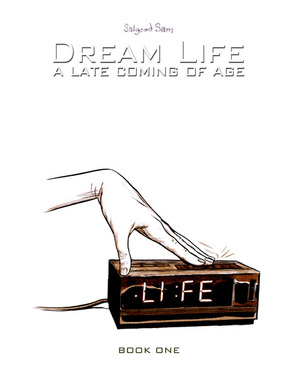
Murder in B.C. leads to an inuksuk in Ontario. Charlie’s childhood friend is about to die. Hitchhiking in B.C., PJ’s luck runs out. Lionel is in crisis, time for love? Leslie is a therapist and part-time drug dealer. It’s just occurring to her that she hates her job. Dan’s six-year-old daughter thinks he needs to grow up. She may have a point.
Life is connections and causes you never see coming. Dream Life is the story of five friends confronted with failed dreams and fantasy lives, learning to deal with traumas to their minds, bodies and ideals.
“I couldn’t put this down. Seriously. It’s a keeper. Salgood Sam has one of the most interesting, unique voices in comics today.” – Mark Waid
“Those who love and cherish our involuntary interior rambles can enjoy more of a good thing, by diving into Salgood’s universal trance adapter. Those who like to stretch out on the couch and become immersed in a compelling story terrifically told and beautifully drawn can scratch that particular itch as well, via Salgood Sam’s powerful virtuosic graphic novel Dream Life.” - Jim Woodring
“Salgood Sam is a gifted draftsman. In Dream Life you can see he’s enjoying himself immensely drawing every page of this sprawling story. Beautiful stuff.” –Joe Ollmann
EXCERPT FROM DREAM LIFE: A LATE COMING OF AGE
Rusty Talk
Rusty Talk Editor:
Adèle Barclay
The Rusty Toque interviews published writers, filmmakers, editors, publishers on writing, inspiration, craft, drafting, revision, editing, publishing, and community.
Unless otherwise stated all interviews are conducted by email.
Our goal is to introduce our readers to new voices and to share the insights of published/ produced writers which we hope will encourage and inspire those new to writing.
Archives
November 2017
February 2017
October 2016
September 2016
August 2016
June 2016
May 2016
April 2016
February 2016
January 2016
December 2015
October 2015
August 2015
July 2015
June 2015
March 2015
January 2015
December 2014
September 2014
August 2014
July 2014
May 2014
March 2014
December 2013
November 2013
October 2013
September 2013
May 2013
March 2013
February 2013
December 2012
November 2012
October 2012
September 2012
August 2012
July 2012
June 2012
May 2012
April 2012
March 2012
February 2012
January 2012
December 2011
November 2011
October 2011
September 2011
August 2011
Categories
All
Activist
Adele Barclay
Alex Carey
Alex Leslie
Amelia Gray
Andrew F. Sullivan
Ania Szado
Artist
Author
Bill Bissett
Bob Kerr
Bonnie Bowman
Brian Joseph Davis
Carolyn Smart
Cartoonists
Catherine Graham
Children
Christian Bok
Comedians
Cornelia Hoogland
Daniel Zomparelli
Danis Goulet
David Groulx
David Hickey
David Whitton
Dina Del Bucchia
Directors
Documentary
Editors
Elisabeth Harvor
Elizabeth Bachinsky
Emily Schultz
Erin Moure
Experimental
Fiction Writers
Filmmakers
Francisca Duran
Gary Barwin
Glenn Patterson
Griffin
Griffin Poetry Prize
Heather Birrell
Hoa Nguyen
Iain Macleod
Illustrators
Interview
Ivan E. Coyote
Jacob Mcarthur Mooney
Jacob Wren
Jacqueline Valencia
Jane Munro
Jeffrey St. Jules
Jennifer L. Knox
Julie Bruck
Karen Schindler
Kevin Chong
Laura Clarke
Laurie Gough
Linda Svendsen
Lisa Robertson
Lynne Tillman
Madeleine Thien
Maria Meindl
Marita Dachsel
Matt Lennox
Matt Rader
Media Artists
Michael Longley
Michael Robbins
Michael Turner
Michael Vass
Michael V. Smith
Mike Watt
Mina Shum
Mira Gonzalez
M. NourbeSe Philip
Monty Reid
Musician
Myra Bloom
Nadia Litz
Nonfiction Writers
Novelists
Patrick Friesen
Paul Dutton
Penn Kemp
Per Brask
Performers
Playwright
Poetry
Poets
Priscila Uppal
Producers
Publishers
Rachel Zolf
Ray Hsu
Renuka Jeyapalan
Richard Fulco
Richard Melo
Rick Moody
Robin Richardson
Rob Sheridan
Roddy Doyle
Russell Thornton
Sachiko Murakami
Salgood Sam
Scott Beckett
Screenwriters
Semi Chellas
Sharon Mccartney
Sheila Heti
Short Fiction Writers
Sound Artist
Steve Roden
Tanis Rideout
Tom Cull
Translation
Translators
Travel Writers
Trevor Abes
Tv Writers
Ulrikka S. Gernes
Vanessa Place
Visual Art
Vivieno Caldinelli
Writers
Zachariah Wells

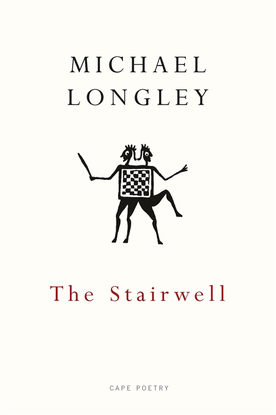

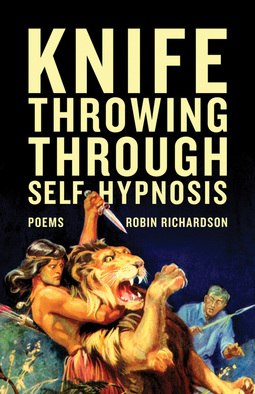


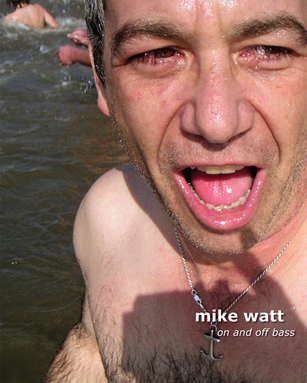
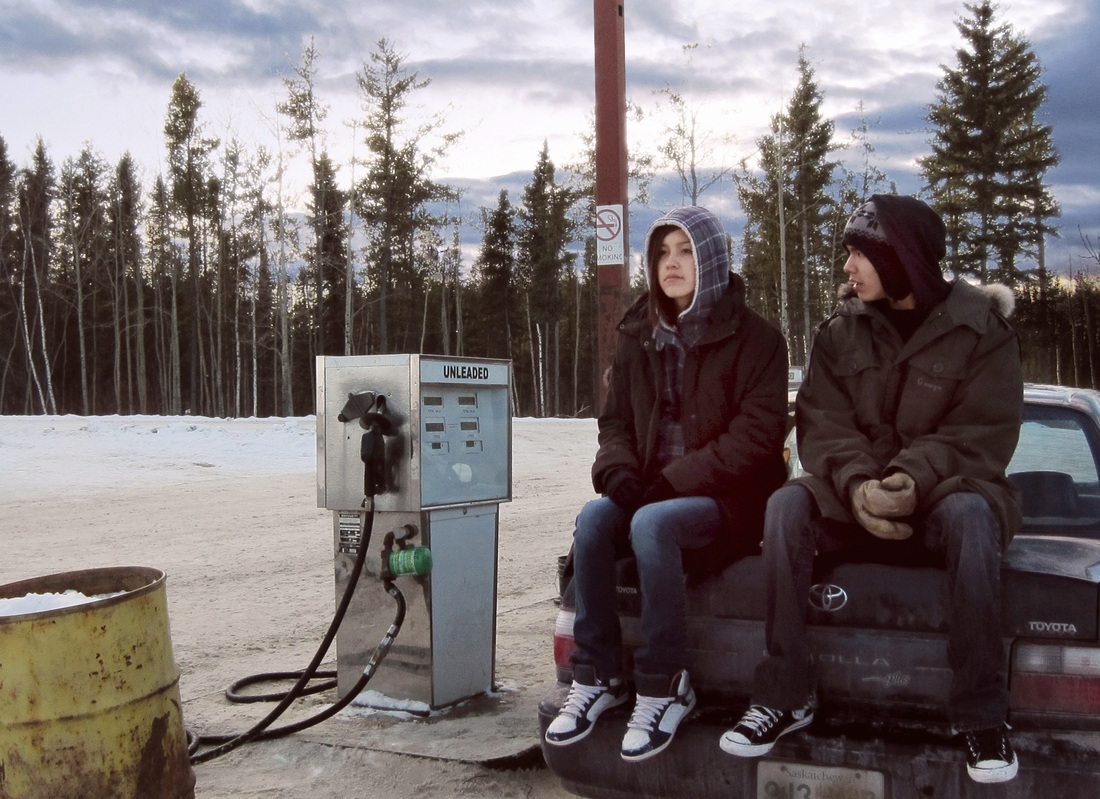
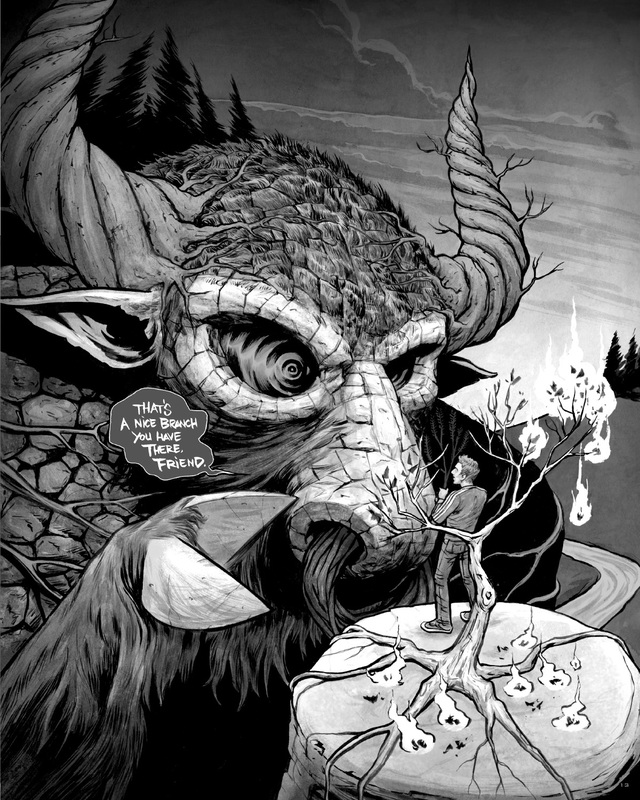
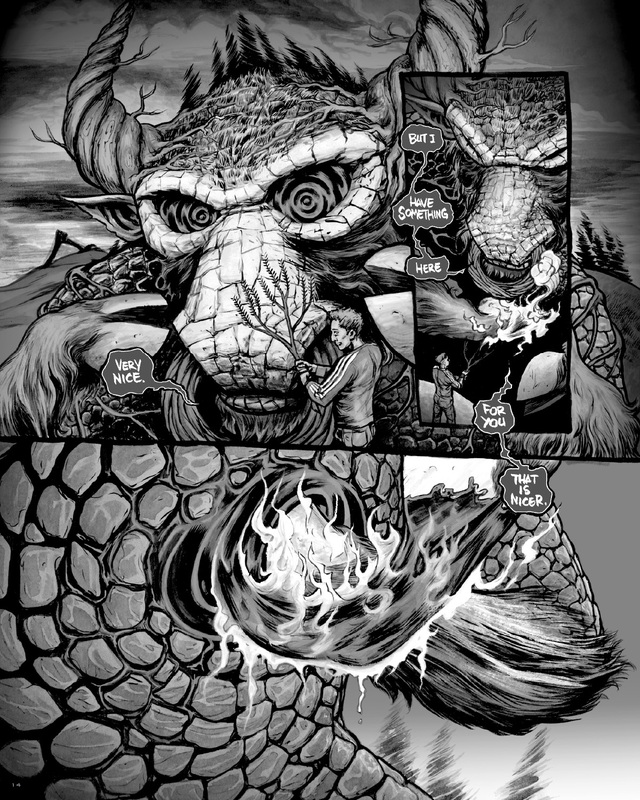
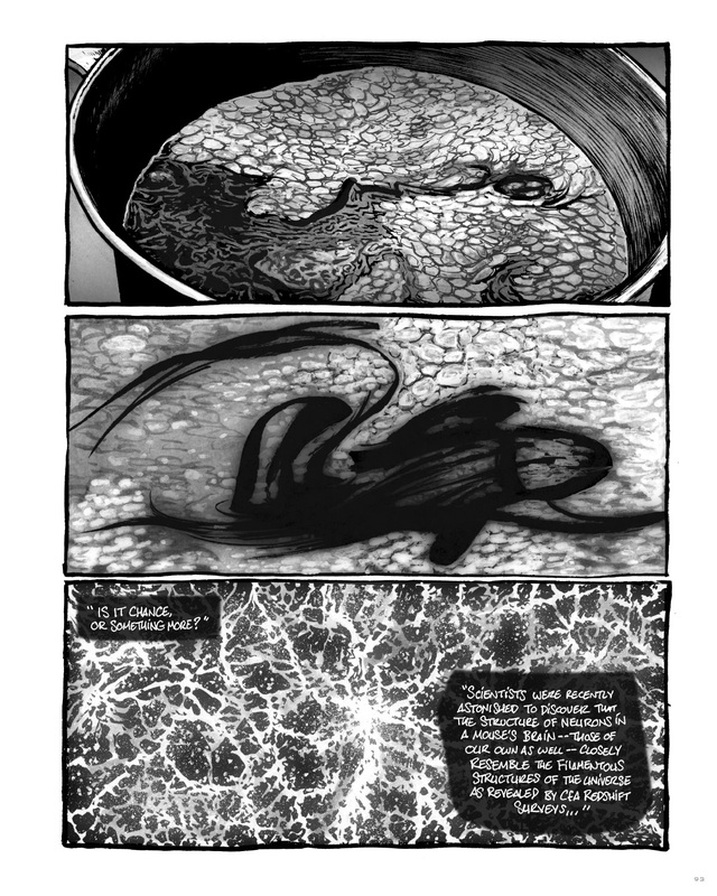
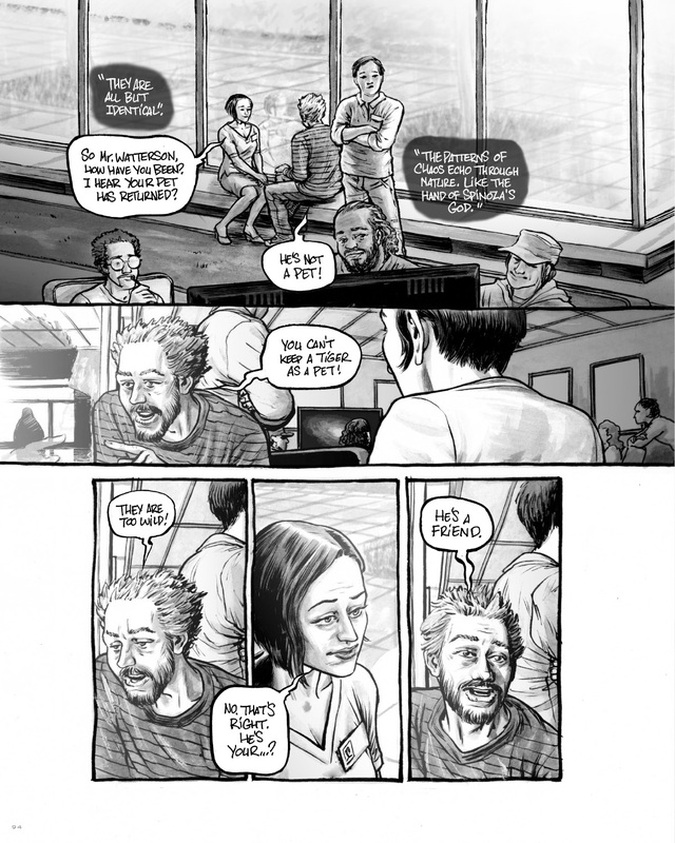
 RSS Feed
RSS Feed
